Search Result
Results for "
Anti-cancer,Anti-proliferative
" in MedChemExpress (MCE) Product Catalog:
1
Biochemical Assay Reagents
| Cat. No. |
Product Name |
Target |
Research Areas |
Chemical Structure |
-
- HY-N7015
-
|
|
EBV
Caspase
Apoptosis
Bacterial
|
Infection
|
|
Zerumbone is an orally active natural cyclic sesquiterpene and can be isolated from Zingiber zerumbet. Zerumbone has anti-proliferative, anti-inflammation, anti-cancer, anti-bacterial and anti-mutagenic activity .
|
-
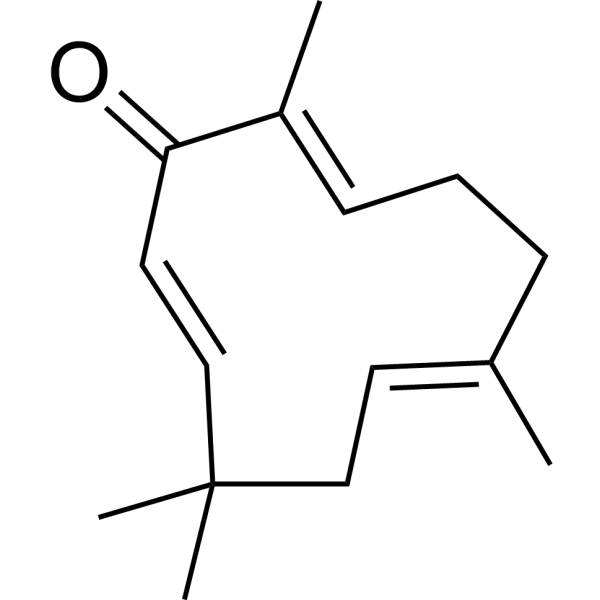
-
- HY-76316
-
-
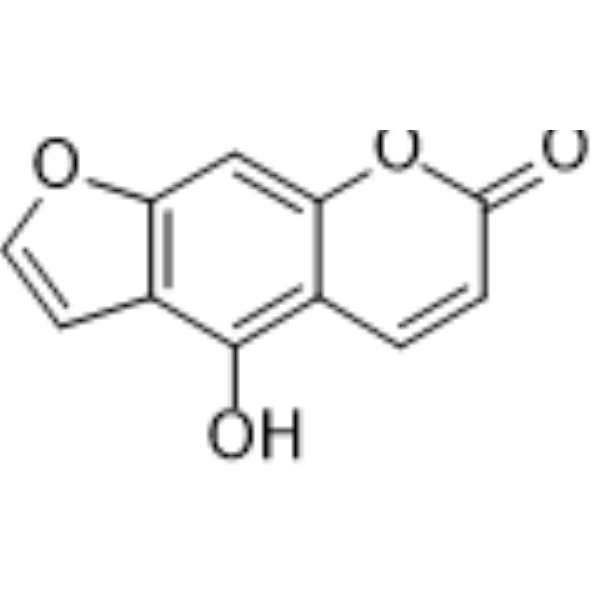
-
- HY-19909
-
|
|
EGFR
|
Cancer
|
|
NRC-2694 is an epidermal growth factor receptor (EGFR) antagonist with anti-cancer and anti-proliferative properties. NRC-2694 is a click chemistry reagent, it contains an Alkyne group and can undergo copper-catalyzed azide-alkyne cycloaddition (CuAAc) with molecules containing Azide groups.
|
-
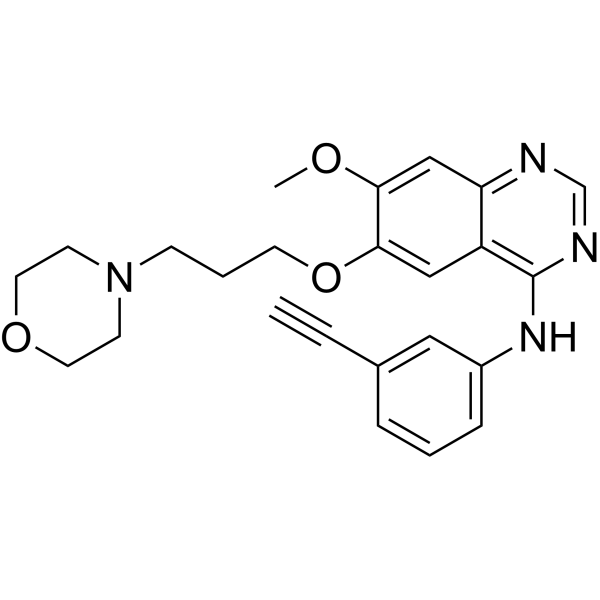
-
- HY-148561
-
|
|
CDK
GSK-3
PKC
|
Cancer
|
|
CDK8-IN-12 is an orally active, potent CDK8 inhibitor with a Ki of 14 nM. CDK8-IN-12 has off-target kinase inhibition on GSK-3α, GSK-3β, PCK-θ with Kis of 13 nM, 4 nM, 109 nM, respectively. CDK8-IN-12 shows potent anti-proliferative effects selectively on MV4-11 cell. CDK8-IN-12 is an anti-cancer agent .
|
-
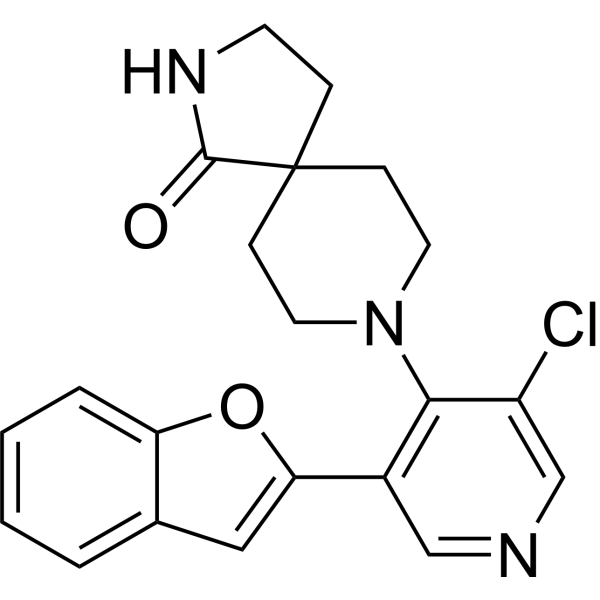
-
- HY-152099
-
|
|
Apoptosis
|
Cancer
|
|
Antiproliferative agent-19 (compound 4a) is an anti-cancer agent that exerts anti-proliferative effects on lung cancer cells by inducing apoptosis. antiproliferative agent-19 also induces cell cycle arrest in the G2/M phase .
|
-
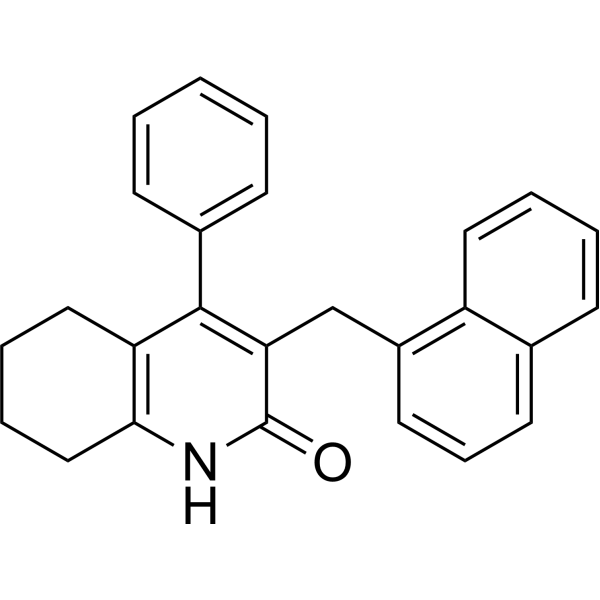
-
- HY-148185
-
|
|
ADC Cytotoxin
|
Cancer
|
|
T01-1 is an anticancer agent (camptothecin derivative) with good anti-proliferative activity .
|
-
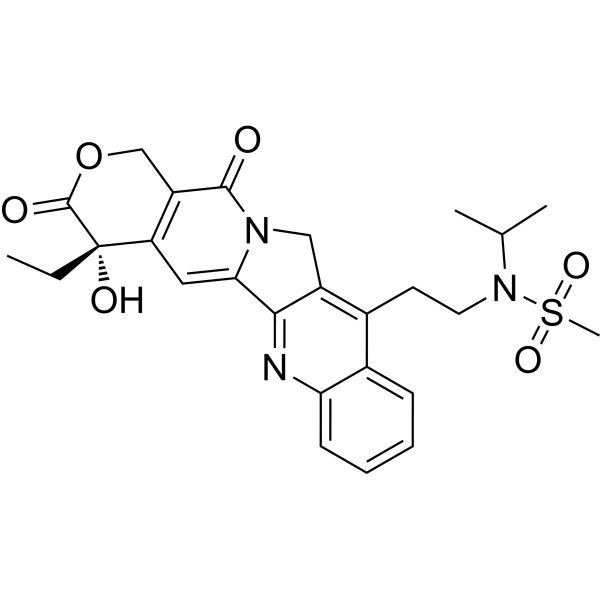
-
- HY-N2510
-
|
Myristicine
|
5-HT Receptor
EGFR
ERK
Apoptosis
Bacterial
|
Infection
Neurological Disease
Inflammation/Immunology
Cancer
|
|
Myristicine is an orally bioavailable serotonin receptor antagonist and weak monoamine oxidase (MAO) inhibitor. Myristicine also exerts anti-cancer effects on gastric cancer cells by inhibiting the EGFR/ERK signaling pathway. Myristicine is the main component of nutmeg essential oil and has anti-cancer, anti-proliferative, antibacterial, anti-inflammatory and apoptosis-inducing effects. Myristicine abuse can produce hallucinogenic effects, organ damage, etc .
|
-
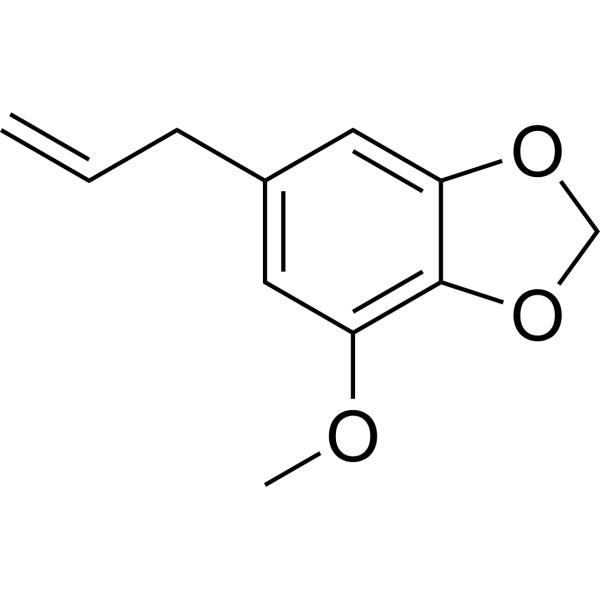
-
- HY-153753
-
|
|
Others
|
Cancer
|
|
Wnt pathway inhibitor 4 (compound 16D) is an anticancer agent that has anti-proliferative activity .
|
-
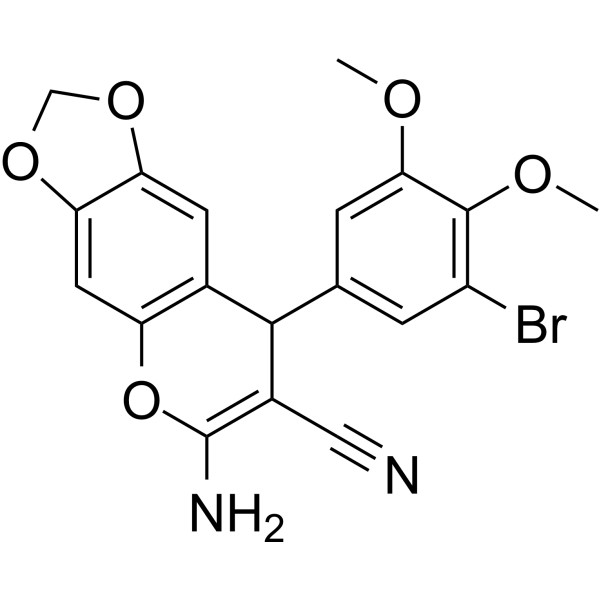
-
- HY-147298
-
|
CYC140
|
Polo-like Kinase (PLK)
|
Cancer
|
|
Plogosertib (CYC140) is a selective, potent, and orally active ATP-competitive PLK1 inhibitor (IC50: 3 nM). Plogosertib is an anti-cancer agent with anti-proliferative activity. Plogosertib can be used in the research of several tumors, including esophageal, gastric, leukemia, non–small cell lung cancer, ovarian, and squamous cell cancers .
|
-
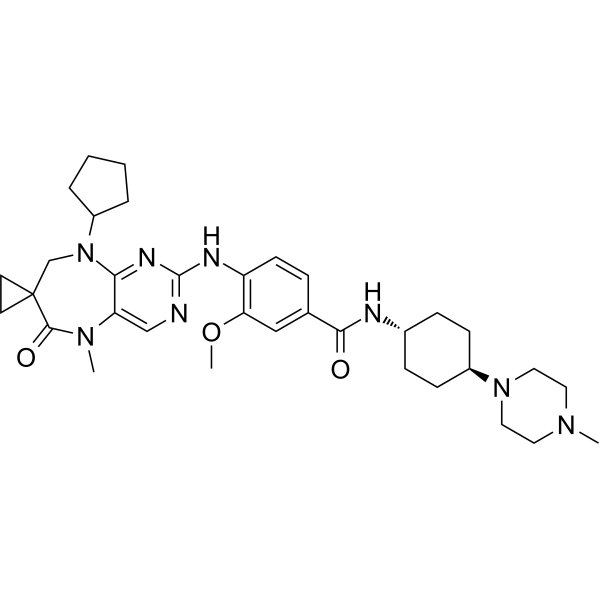
-
- HY-111551
-
FT113
1 Publications Verification
|
Fatty Acid Synthase (FASN)
|
Cancer
|
|
FT113 is a potent and orally active fatty acid synthase (FASN) inhibitor, with an IC50 of 213 nM for full-length recombinant human FASN enzyme. In cell-based assay, FT113 blocks FASN activity in BT474 cells (IC50, 90 nM). FT113 shows anti-proliferative activity, and exhibits anti-cancer activity both in vitro and in vivo .
|
-
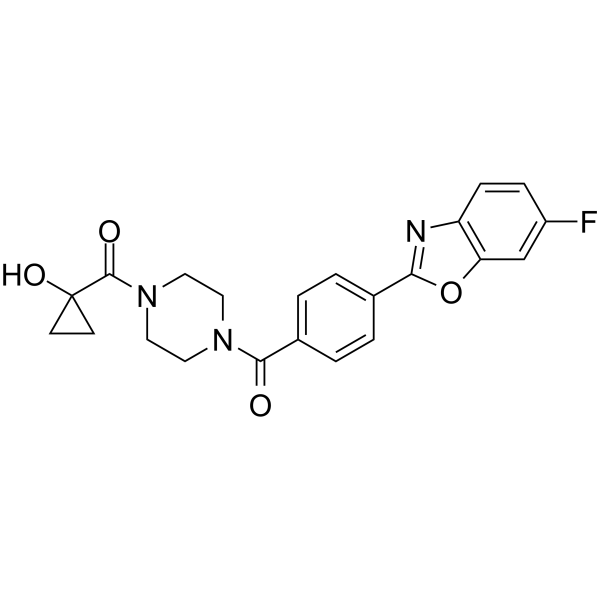
-
- HY-107470
-
|
|
Others
|
Inflammation/Immunology
Cancer
|
|
Antitumor agent-21 is an aryl-quinolin derivative, with potential anticancer, anti-inflammatory, anti-proliferative, anti-hormonal effects and inhibition of vasculogenic mimicry .
|
-
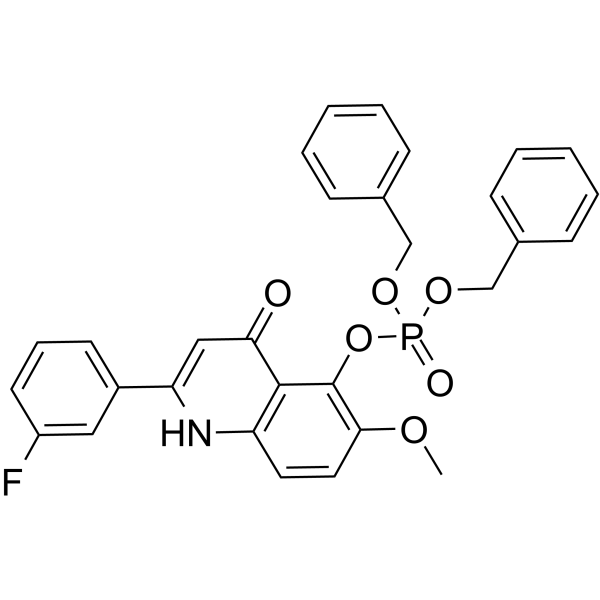
-
- HY-N10392
-
|
|
Apoptosis
|
Cancer
|
|
(S)-Erypoegin K is a potent anticancer agent. (S)-Erypoegin K shows potent anti-proliferative activity against HL-60 cells. (S)-Erypoegin K induces apoptosis .
|
-
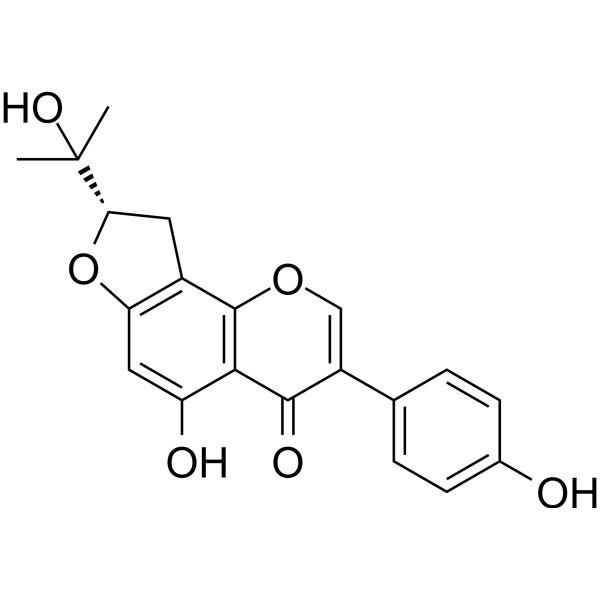
-
- HY-149927
-
|
|
Others
|
Cancer
|
|
Antitumor agent-91 is a cyclic phosphate ester derivative with anticancer and anti-proliferative activities. Antitumor agent-91 has potential application in human castration resistant prostate cancer and pancreatic cancer .
|
-
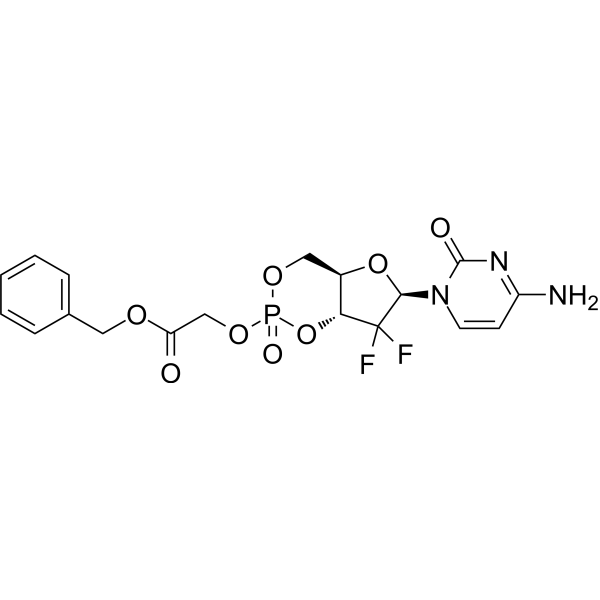
-
- HY-147776
-
|
|
MDM-2/p53
|
Cancer
|
|
Antiproliferative agent-8 (Compound 5a) is an anti-cancer agent. Antiproliferative against-8 has antiproliferative activity. Antiproliferative agent-8 significantly increases the P53 levels .
|
-
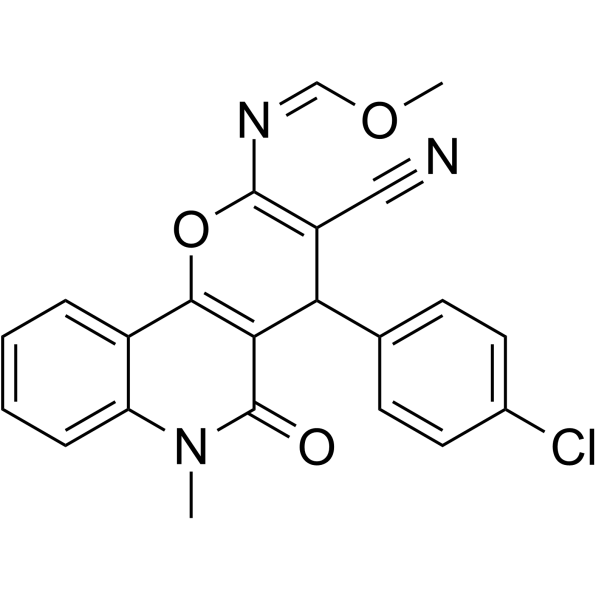
-
- HY-126423
-
|
Isorhamnetin 3-O-glucuronide
|
Others
|
Cancer
|
|
Isorhamnetin 3-glucuronide is a potent anticancer agent. Isorhamnetin 3-glucuronide shows anti-proliferative activity. Isorhamnetin 3-glucuronide induces Apoptosis and cell cycle arrest at S-phase .
|
-
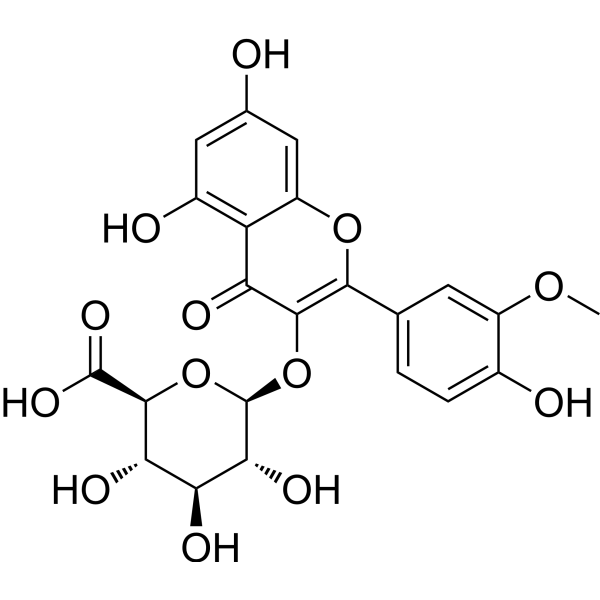
-
- HY-152945
-
|
|
NF-κB
|
Cancer
|
|
Antiproliferative agent-22 (compound 2) is an anticancer agent. Antiproliferative agent-22 shoes anti-proliferative activities against MCF-7, MDA-MB-231 and MDA-MB-468 cells with IC50 values of 6.2 μM, 3.3 μM and 3.3 μM, respectively .
|
-
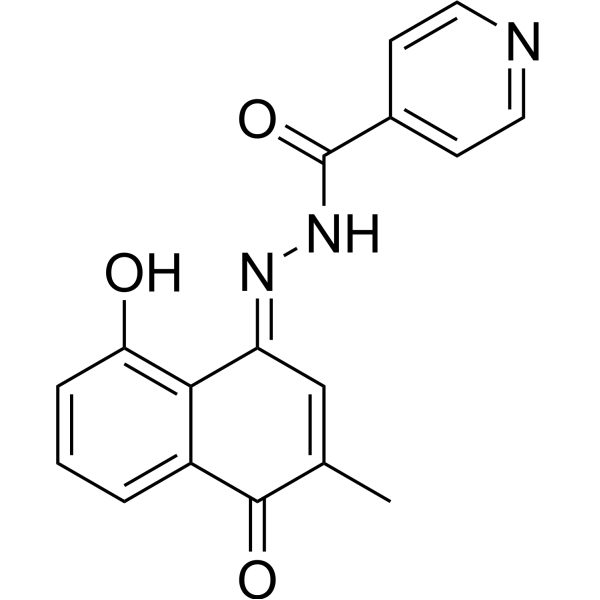
-
- HY-N7640
-
|
|
Others
|
Inflammation/Immunology
Cancer
|
|
Desoxylimonin is an orally active triterpenoid compound found from grapefruit seed. Desoxylimonin shows anti-proliferative activities to breast cancer cells. Desoxylimonin derivatives shows better anticancer, analgesic and anti-inflammatory activity than the lead compound .
|
-
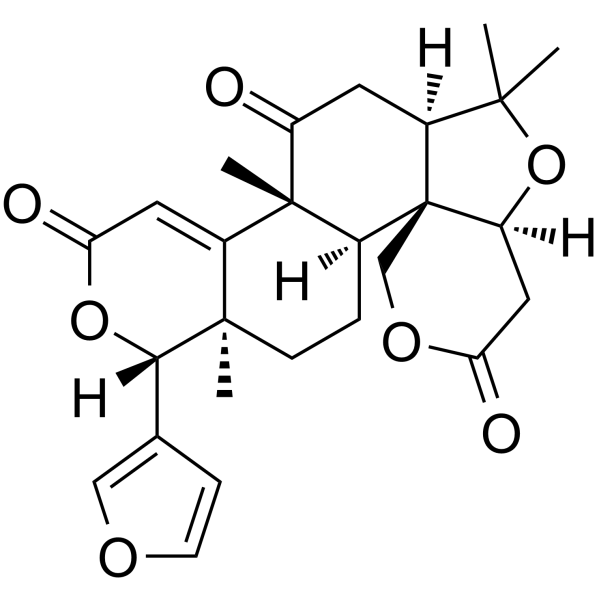
-
- HY-B0988
-
-
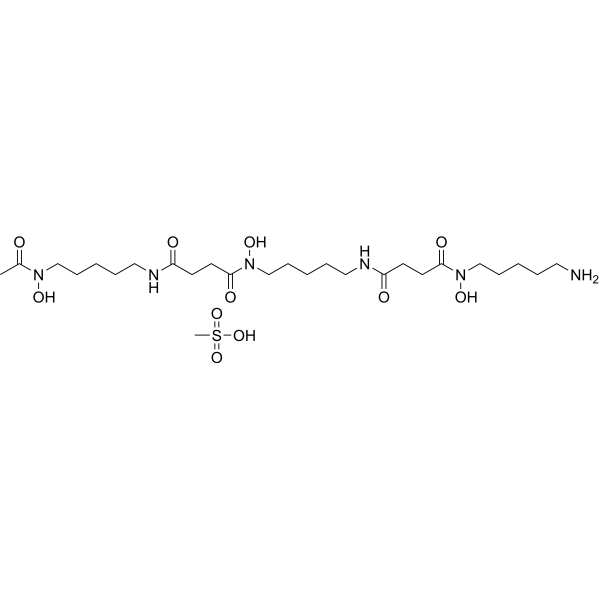
-
- HY-B1625
-
-
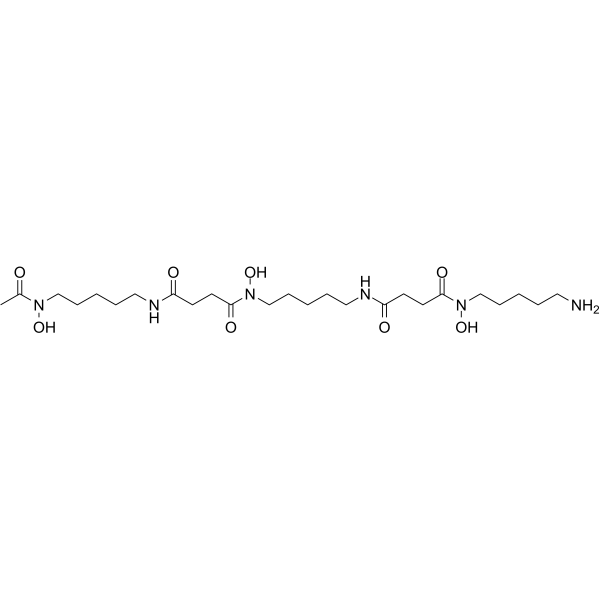
-
- HY-156450
-
|
|
ERK
|
Cancer
|
|
ERK5-IN-5 (compound 4a) is an ERK5 kinase inhibitor with anticancer activity. ERK5-IN-5 exhibits good anti-proliferative activity with the IC50 value of 6.23 µg/mL for A549 cells .
|
-
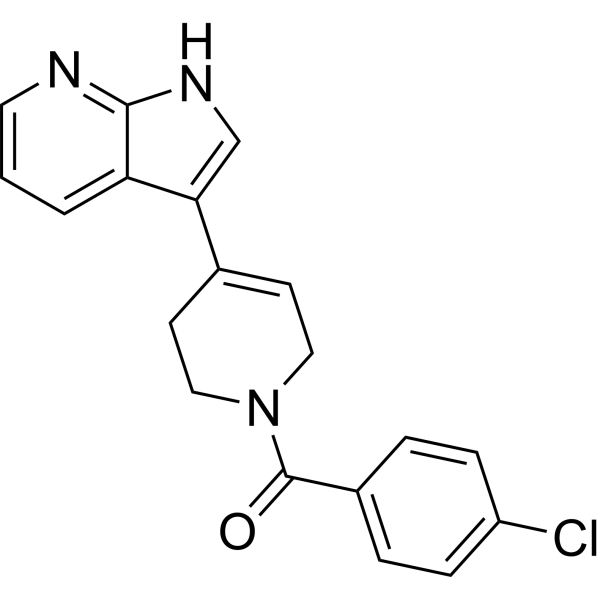
-
- HY-156451
-
|
|
ERK
|
Cancer
|
|
ERK5-IN-6 (compound 5J) is an ERK5 kinase inhibitor with anticancer activity. ERK5-IN-6 exhibits good anti-proliferative activity with the IC50 value of 4.56 µg/mL for A549 cells .
|
-
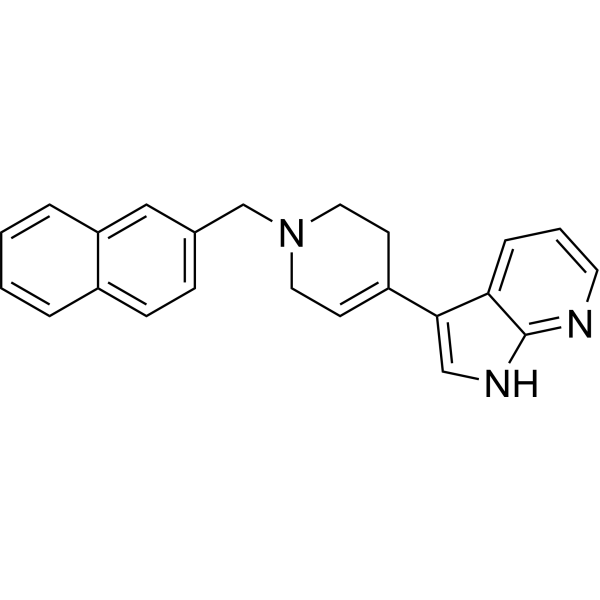
-
- HY-115980
-
|
|
Apoptosis
|
Cancer
|
|
Anticancer agent 39 (compound B12), a fluorescent derivative of Jiyuan Oridonin A (JOA), induces the collapse of mitochondrial membrane potential (MMP)and thus induced apoptosis.Anticancer agent 39 inhibits cell cloning and migration.Anticancer agent 39 exhibits promising anti-proliferative activity against HGC-27 cells with IC50 value of 0.39 μM .
|
-
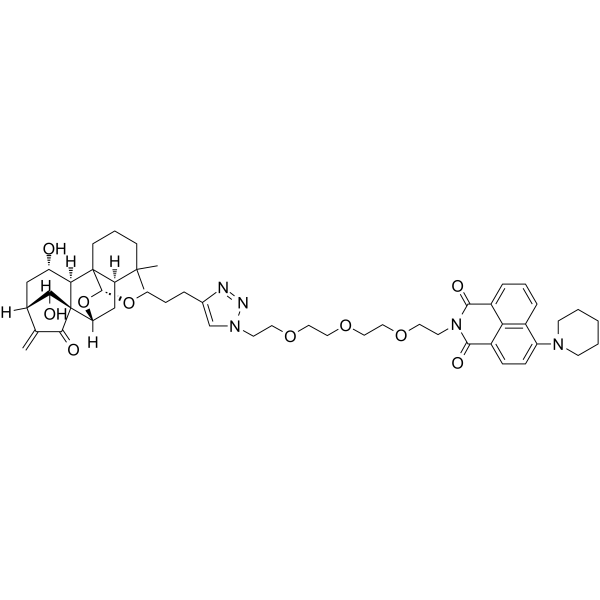
-
- HY-156843
-
|
|
Others
|
Cancer
|
|
Antiproliferative agent-38 (com 18) is a tetracyclic ring, but its most reactive ring nitrogen (probably the quinoline moiety) cannot undergo N-alkylation. Antiproliferative agent-38 lacks anti-malarial activity and lacks anti-cancer cell proliferation activity .
|
-
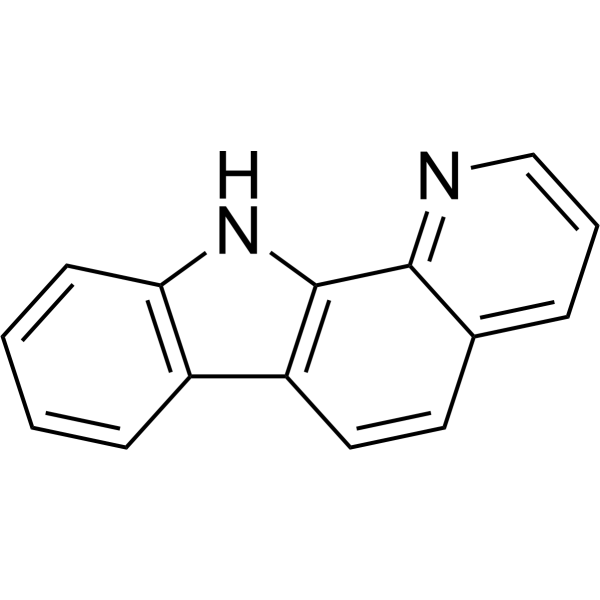
-
- HY-N10660
-
|
(-)-Dictyostatin; Dictyostatin 1
|
Microtubule/Tubulin
|
Cancer
|
|
Dictyostatin ((-)-Dictyostatin; Dictyostatin 1) is a potent microtubule stabilizing agent. Dictyostatin also is a anti-cancer agent. Dictyostatin shows antiproliferative activity. Dictyostatin has the potential for the research of tauopathies .
|
-
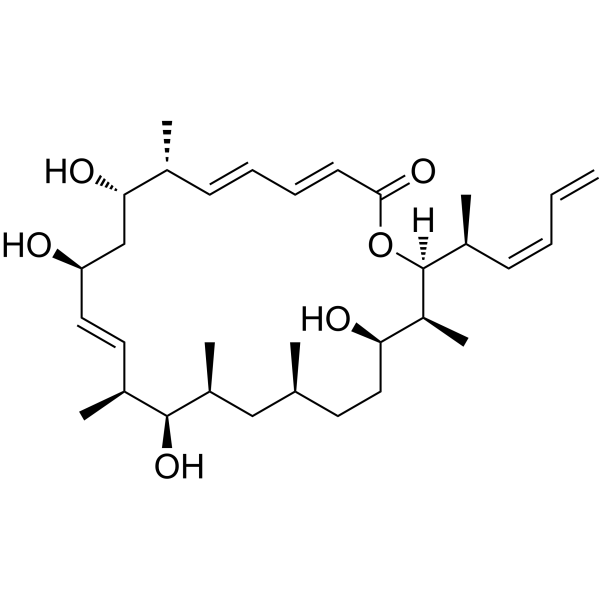
-
- HY-10082A
-
|
(E)-PAN-811; (E)-NSC# 663249; (E)-OCX191
|
DNA/RNA Synthesis
|
Cancer
|
|
(E)-3-AP is the E configuration of 3-AP. 3-AP is a potent ribonucleotide reductase inhibitor. 3-AP shows anti-proliferative activity. 3-AP shows anticancer activity in L1210 leukemia model. 3-AP inhibits RR activity and DNA synthesis .
|
-
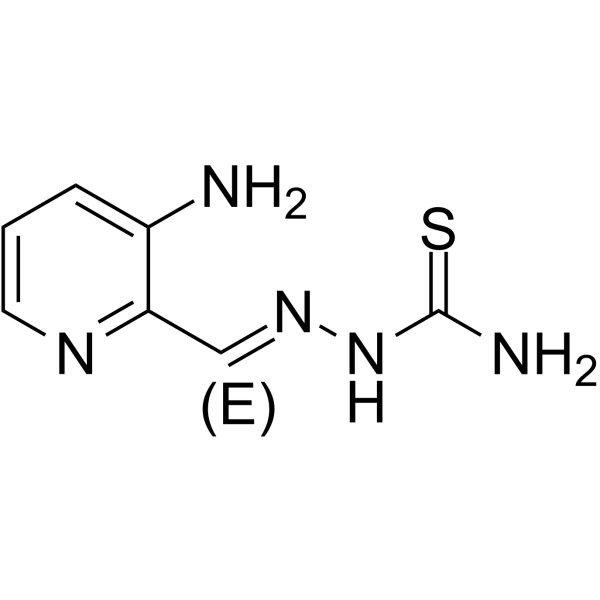
-
- HY-157164
-
|
|
PROTACs
Histone Methyltransferase
|
Cancer
|
|
PROTAC EZH2 Degrader-2 (compound E-3P-MDM2), an EZH2 inhibitor, is a PROTAC composed of Tazemetostat (EPZ6438) and an E3 ligase system ligand. PROTAC EZH2 Degrader-2 degrades EZH2 in SU-DHL-6 cells in a dose-dependent manner, inhibits the expression of H3K27me3, and simultaneously degrades EED and SUZ12 proteins without affecting their mRNA levels. PROTAC EZH2 Degrader-2 has anti-cancer and anti-proliferative activity .
|
-
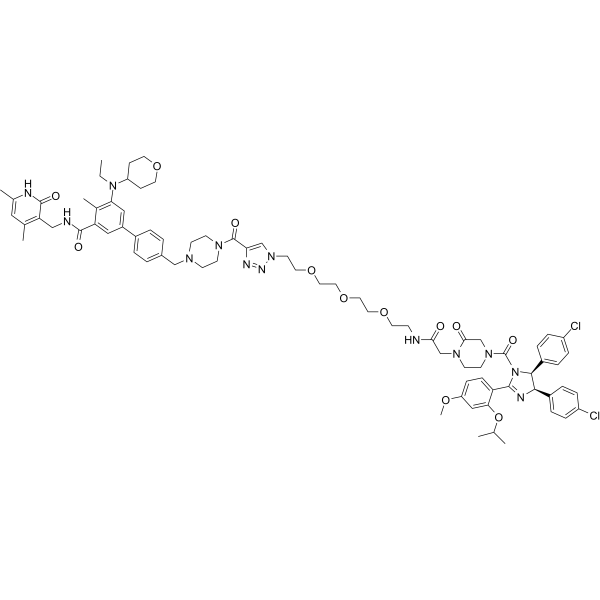
-
- HY-147892
-
|
|
HDAC
Apoptosis
|
Cancer
|
|
HDAC-IN-42 (compound 14f) is a potent and selective HDAC inhibitor with IC50 values of 0.19 and 4.98 µM for HDAC1 and HDAC6, respectively. HDAC-IN-42 shows anticancer and anti-proliferative activity. HDAC-IN-42 induces apoptosis and cell cycle arrest at G2/M phase .
|
-
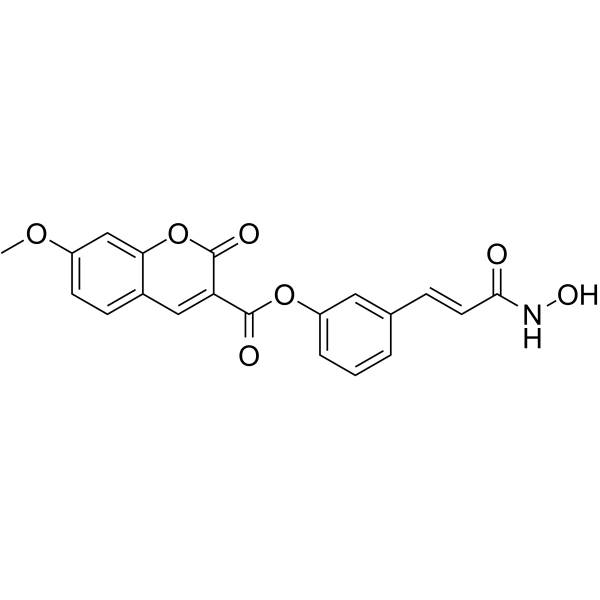
-
- HY-15995
-
|
TubA
|
ADC Cytotoxin
Antibiotic
Microtubule/Tubulin
|
Cancer
|
|
Tubulysin A (TubA) is an anticancer and antiangiogenic agent with anti-microtubule, anti-mitosis and anti-proliferative activity against a variety of cancer cells with IC50 values in the pmol range. It can induce apoptosis of cancer cells and has no effect on normal cells. Tubulysins are a group of potent cytotoxins consisting of nine members (A-I). Tubulysin A can synthesize ADC as ADC Cytotoxin< b>ADC Cytotoxin .
|
-
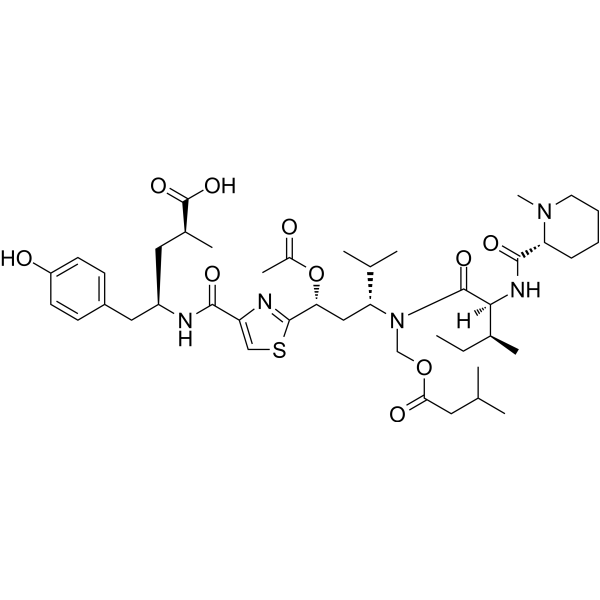
-
- HY-143463
-
|
|
c-Met/HGFR
|
Cancer
|
|
AC-386 is a highly potent c-Met inhibitor with IC50 value of 7.42 nM. AC-386 has antiproliferative activities against certain cancer cell lines. AC-386 can be used for researching anti-cancer resistance .
|
-
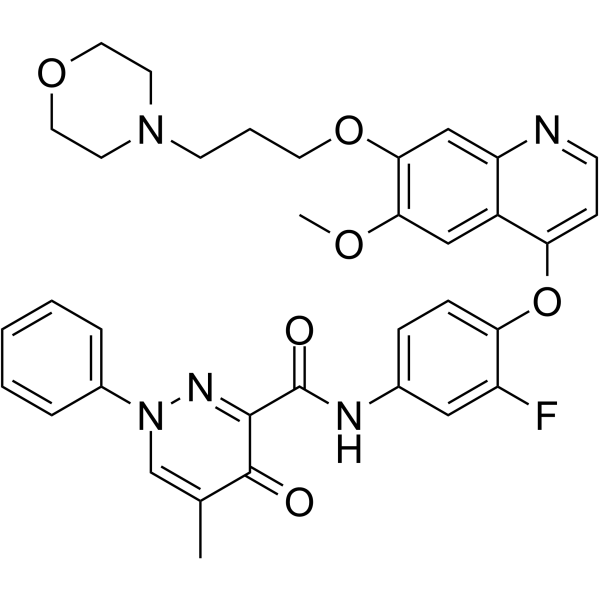
-
- HY-131031
-
|
|
DNA Alkylator/Crosslinker
|
Cancer
|
|
KCC-07 is a potent, selective and brain-penetrant MBD2 (methyl-CpG-binding domain protein 2) inhibitor. KCC-07 prevents binding of MBD2 to methylated DNA and activates brain specific angiogenesis inhibitor 1 (BAI1) inducing anti-proliferative BAI1/p53/p21 signaling. Anticancer activity .
|
-
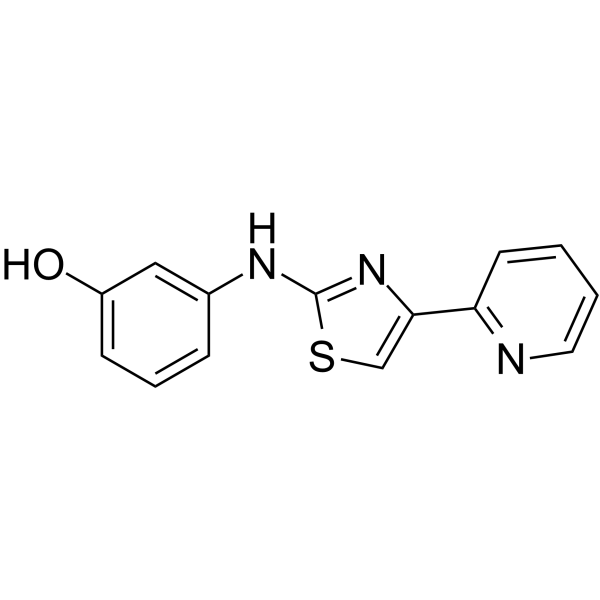
-
- HY-N6064
-
|
|
Apoptosis
IAP
|
Cancer
|
|
Polygalacin D (PGD) is a bioactive compound isolated from Platycodon grandiflorum with anticancer and anti-proliferative properties.
PGD suppresses the expression of the IAP family of proteins including survivin, cIAP-1 and cIAP-2 and blocks the PI3K/Akt pathway by inhibiting the phosphorylation of GSK3β, Akt and the expression of PI3K. Polygalacin D induces apoptosis
|
-
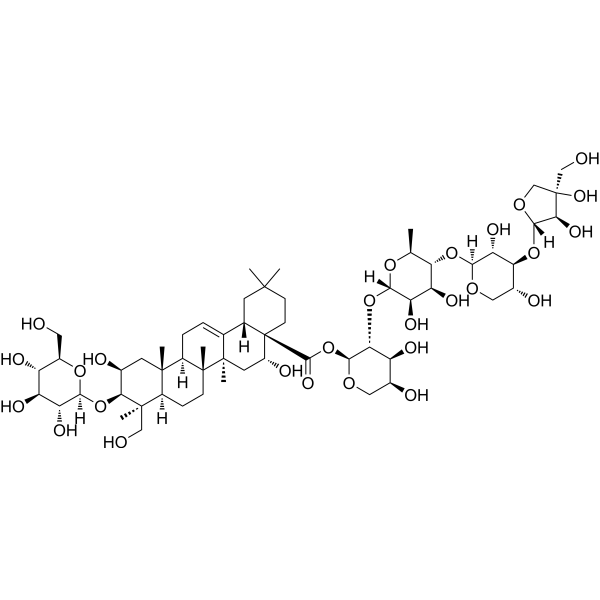
-
- HY-151168
-
|
|
Bacterial
|
Inflammation/Immunology
Cancer
|
|
3-Chlorogentisyl alcohol is a potent E. coli β-glucuronidase inhibitor with an IC50 value of 0.74 μM, an Ki value of 0.58 μM. 3-Chlorogentisyl alcohol shows antiproliferative activity. 3-Chlorogentisyl alcohol has the potential for the research of anti-cancer and anti-inflammatory therapies .
|
-
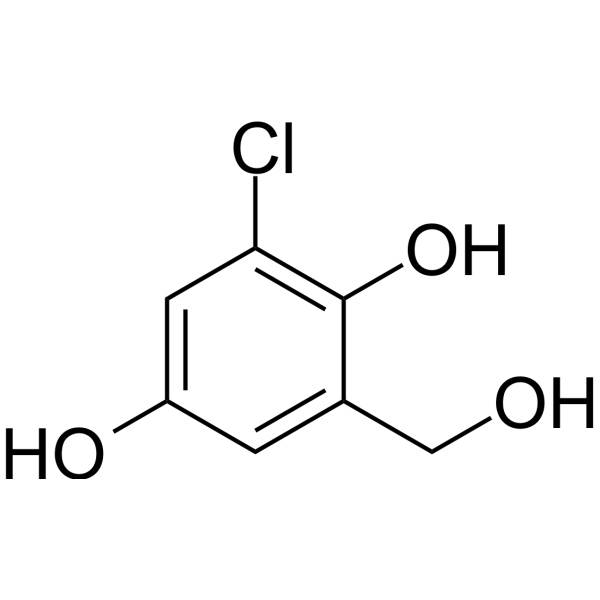
-
- HY-151166
-
|
|
Bacterial
|
Cancer
|
|
β-Glucuronidase-IN-2 is a potent E. coli β-glucuronidase inhibitor with an IC50 value of 0.24 μM, an Ki value of 1.09 μM. β-Glucuronidase-IN-2 shows antiproliferative activity. β-Glucuronidase-IN-2 has the potential for the research of anti-cancer and anti-inflammatory therapies .
|
-
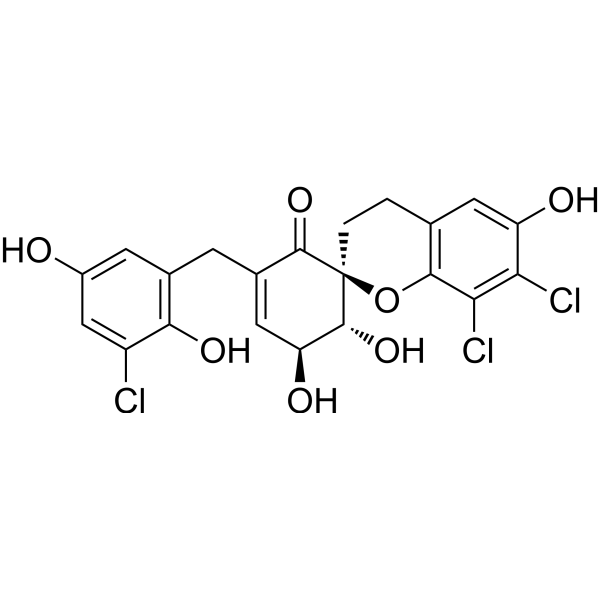
-
- HY-151375
-
|
|
Others
|
Cancer
|
|
CDK9/10/GSK3β-IN-1 (compound 13c) is a kinase inhibitor (Flavopiridol (HY-10005) analogue) that effectively inhibits HsGSK3β (IC50=59 nM), HsCDK9/CyclinT (IC50=64 nM), HsCDK5/p25 (IC50=1.093 µM) and HsCDK2/CyclinA (IC50=1.725 µM). CDK9/10/GSK3β-IN-1 has anti-cancer cellular activity comparable to or higher than that of Flavopiridol. CDK9/10/GSK3β-IN-1 shows high anti-proliferative activity in vitro against up to seven cancer cell lines .
|
-
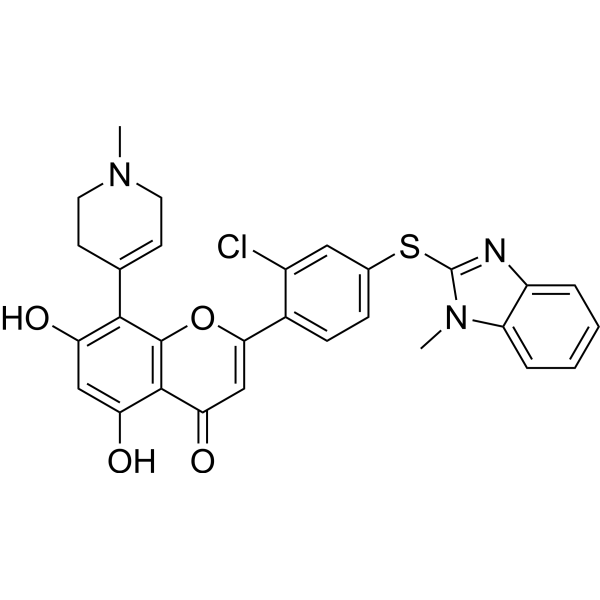
-
- HY-152090
-
|
|
Bacterial
Sirtuin
|
Infection
Cancer
|
|
Antiproliferative agent-17 is an antiproliferative agent. Antiproliferative agent-17 inhibits Gram-positive bacteria and has anticancer activity .
|
-
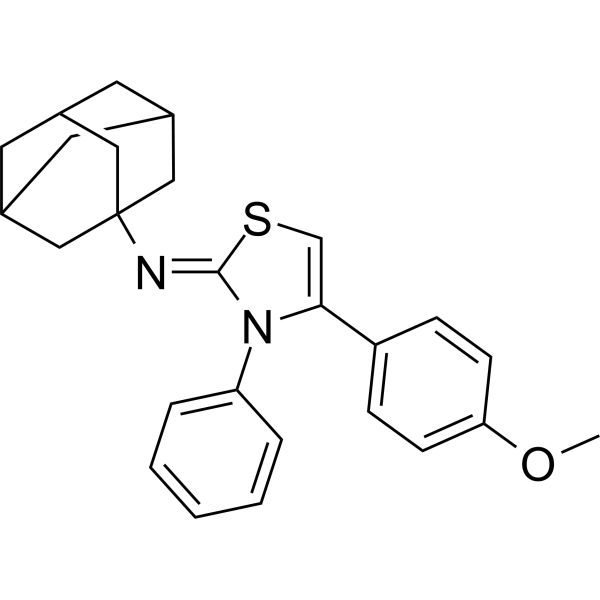
-
- HY-142085
-
|
|
Others
|
Cancer
|
|
Antiproliferative agent-20 is a potent and orally active anticancer agent. Antiproliferative agent-20 exhibits antiproliferative and anti-angiogenic activities .
|
-
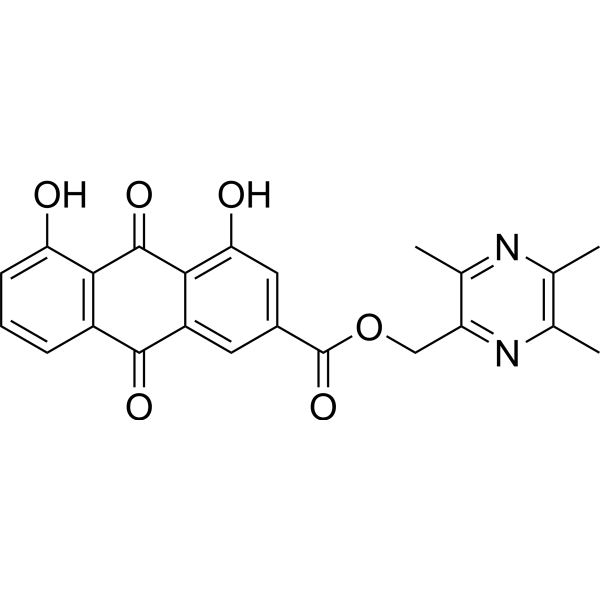
-
- HY-111552
-
|
|
Pim
|
Cancer
|
|
PIM1-IN-1 is a potent and highly selective PIM1/3 inhibitor, with IC50s of 7, 5530 and 70 nM for PIM1, PIM2, and PIM3, respectively, inhibits the phosphorylation of BAD, a downstream target of PIM, with an EC50 of 262 nM. PIM1-IN-1 shows no obvious effect on FLT3 or hERG binding. Antiproliferative and anti-cancer activity .
|
-
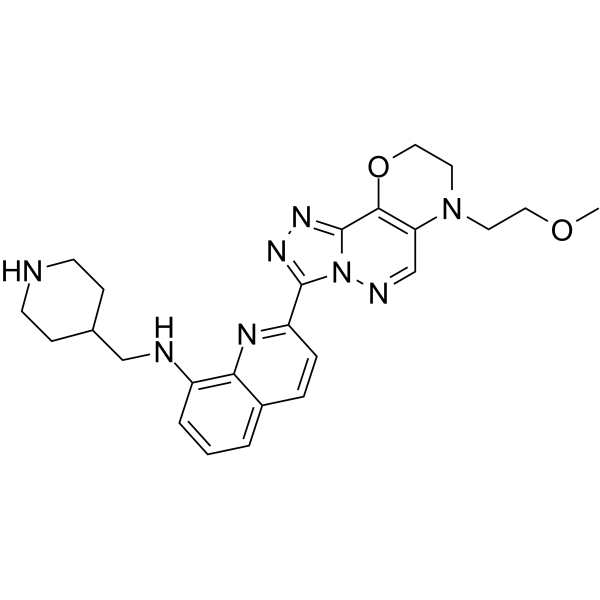
-
- HY-156777
-
|
|
Others
|
Cancer
|
|
Antiproliferative agent-36 (compound 8i) is a benzothiazolyl hydrazones derived compound with antiproliferative activity. Antiproliferative agent-36 has a broad-spectrum anticancer activity .
|
-
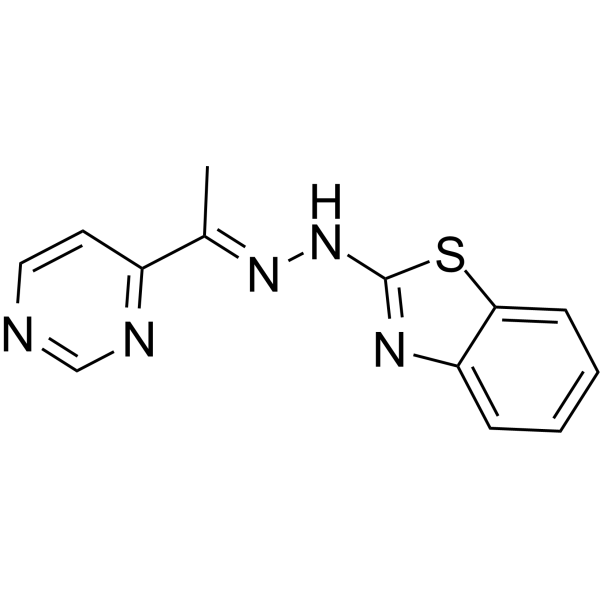
-
- HY-N7279
-
|
(+)-EpiaschAntin
|
Others
|
Cancer
|
|
Epiaschantin is an anticancer agent. Epiaschantin shows antiproliferative activity .
|
-
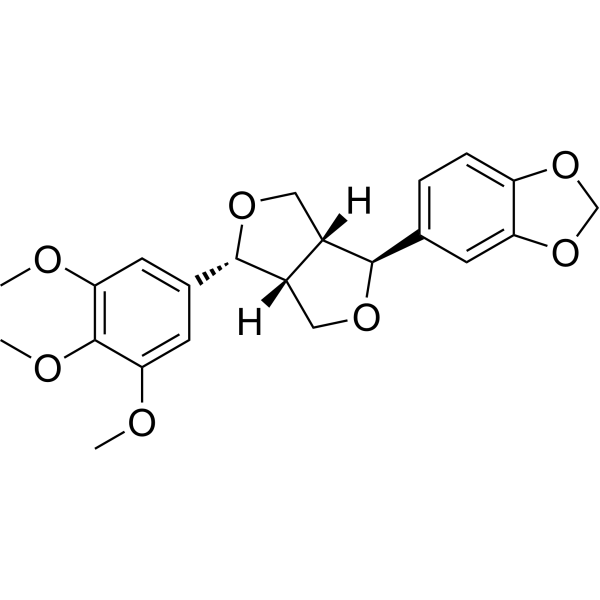
-
- HY-115463
-
EB-3D
1 Publications Verification
|
AMPK
Apoptosis
|
Cancer
|
|
EB-3D is a potent and selective choline kinase α (ChoKα) inhibitor, with an IC50 of 1 μM for ChoKα1. EB-3D exerts effects on ChoKα expression, AMPK activation, apoptosis, endoplasmic reticulum stress and lipid metabolism. EB-3D exhibits a potent antiproliferative activity in a panel of T-leukemia cell lines. Anti-cancer activity .
|
-
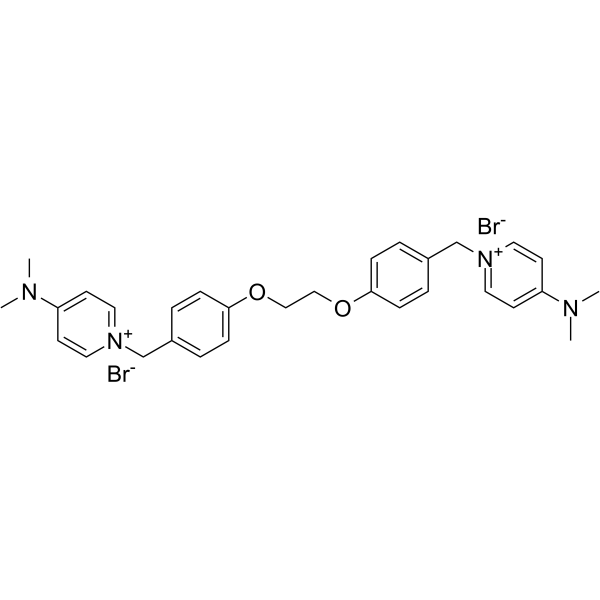
-
- HY-W278944
-
|
|
Others
|
Cancer
|
|
Antiproliferative agent-15 is an anticancer agent. Antiproliferative agent-15 shows antiproliferative activity against human colon (HCT116 and HCT15) and brain (LN-229 and GBM-10) cancer cell lines .
|
-
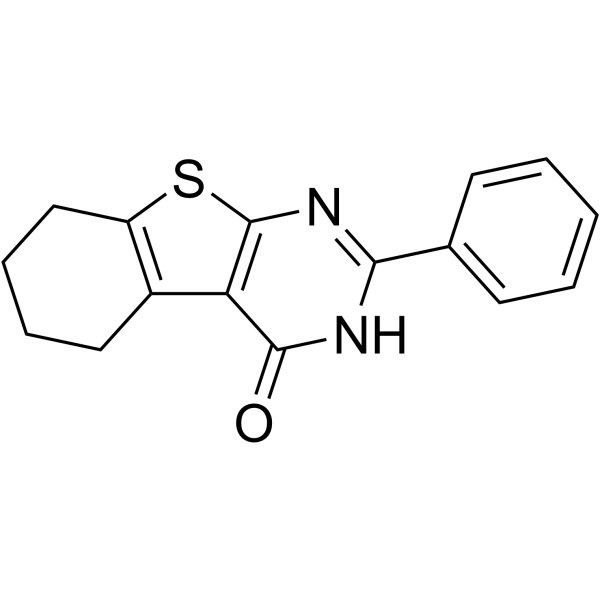
-
- HY-146358
-
|
|
Microtubule/Tubulin
|
Cancer
|
|
Anticancer agent 49 (compound 69) is a broad spectrum anticancer agent. Anticancer agent 49 inhibits tubulin polymerization. Anticancer agent 49 shows antiproliferative activity. Anticancer agent 49 has the potential for the research of solid and hematological tumors .
|
-
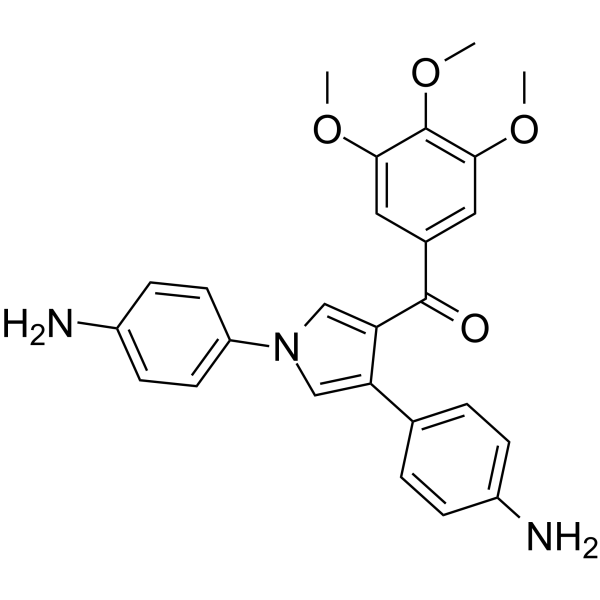
-
- HY-146030
-
|
|
Others
|
Cancer
|
|
Anticancer agent 46 (compound 2) is a potent anticancer agent. Anticancer agent 46 shows antiproliferative activity with an IC50 of 0.986 µM for MGC803 cells. Anticancer agent 46 has the potential for the research of gastric cancer .
|
-
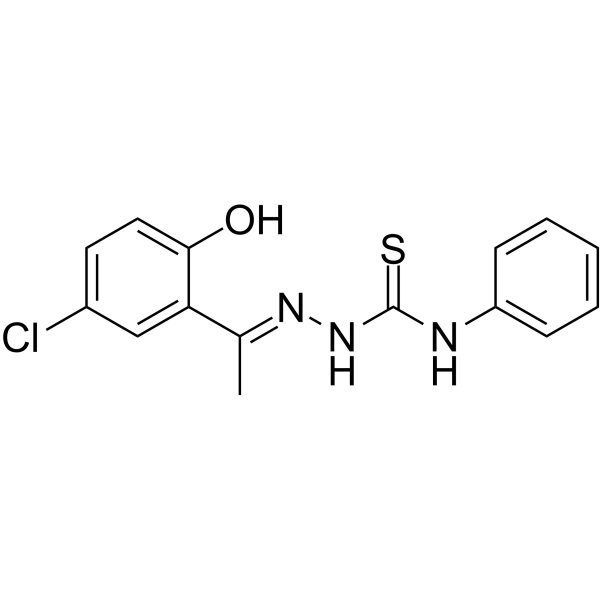
-
- HY-146357
-
|
|
Microtubule/Tubulin
|
Cancer
|
|
Anticancer agent 48 (compound 48) is a broad spectrum anticancer agent. Anticancer agent 48 inhibits tubulin polymerization. Anticancer agent 48 shows antiproliferative activity. Anticancer agent 48 shows antitumor activity in vivo. Anticancer agent 48 has the potential for the research of solid and hematological tumors .
|
-
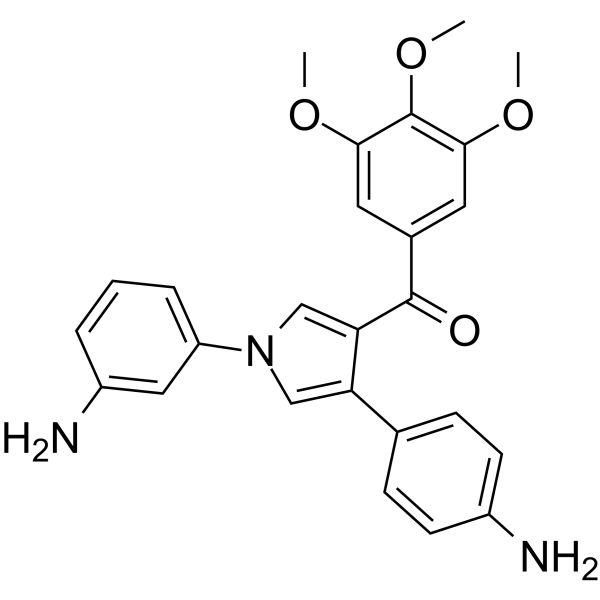
-
- HY-N1497
-
|
2-Methyljuglone
|
|
|
|
Plumbagin (2-Methyljuglone) is a naphthoquinone isolated from Plumbago zeylanica, exhibits anticancer and antiproliferative activities .
|
-
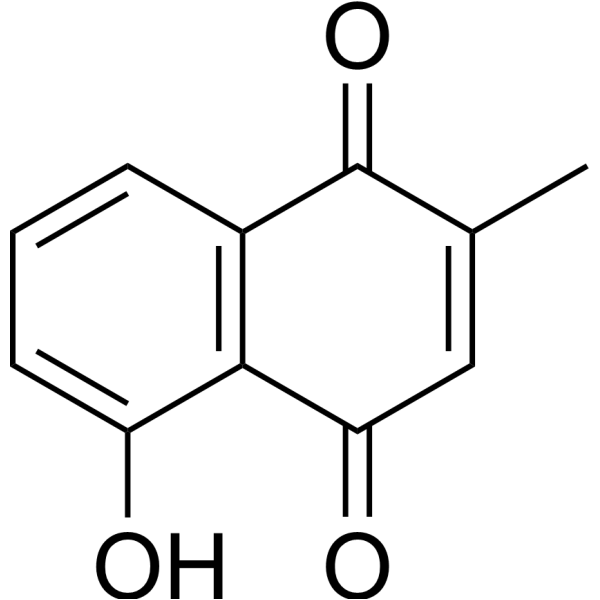
-
- HY-146063
-
|
|
Apoptosis
|
Cancer
|
|
Anticancer agent 54 is a potent anticancer agent. Anticancer agent 54 shows antiproliferative activity. Anticancer agent 54 induces apoptosis and cell cycle arrest at G0/G1 phases. Anticancer agent 54 shows anticancer activity depends on DNA intercalation and ROS generation .
|
-
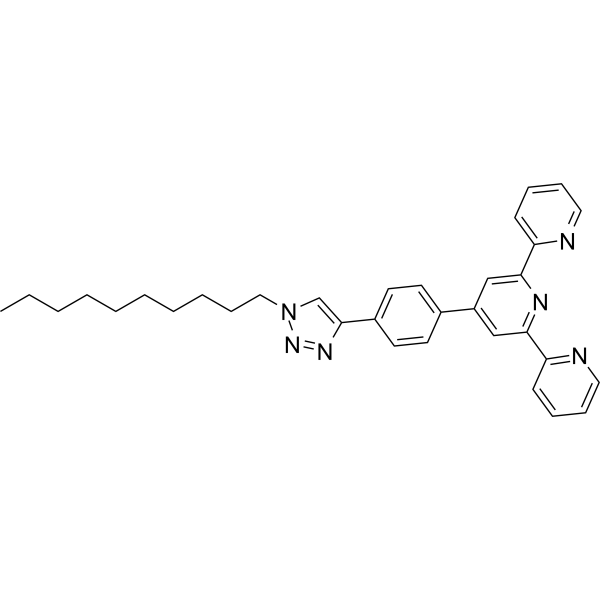
-
- HY-137756
-
|
|
JAK
|
Cancer
|
|
JAK2-IN-6, a multiple-substituted aminothiazole derivative, is a potent and selective JAK2 inhibitor with an IC50 of 22.86 μg/mL. JAK2-IN-6 shows no activity against JAK1 and JAK3. JAK2-IN-6 has anti-proliferative effect against cancer cells .
|
-
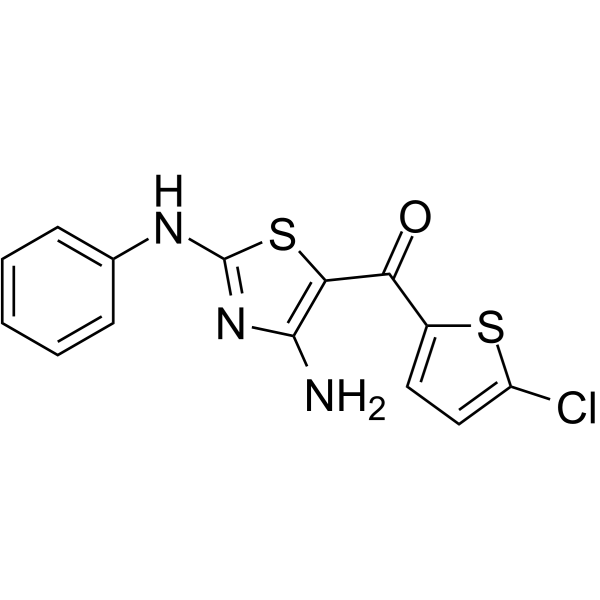
-
- HY-148453
-
|
|
Others
|
Cancer
|
|
Antiproliferative agent-16 is an indolyl hydrazide-hydrazone compound with anticancer activity. Antiproliferative agent-16 exhibits specificity toward breast cancer cells (IC50 of 6.94 μM for MCF-7 cells) .
|
-
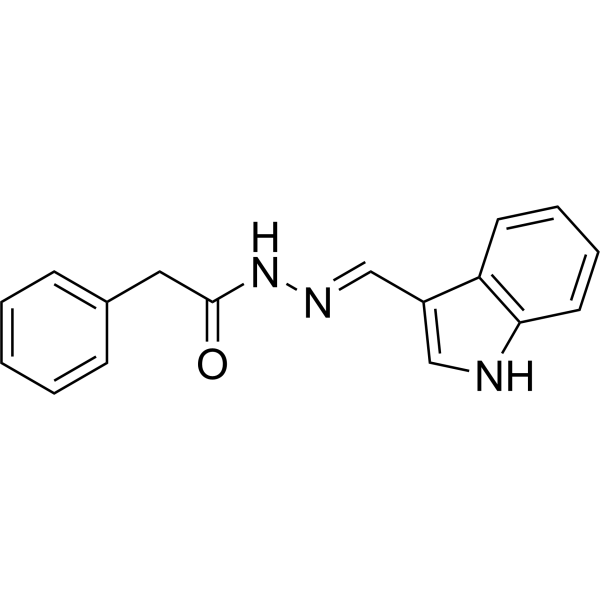
-
- HY-146390
-
|
|
Autophagy
Reactive Oxygen Species
|
Cancer
|
|
Antiproliferative agent-5 (compound 4o) can significantly and irreversibly inhibit proliferation of gastric cancer cells. Antiproliferative agent-5 causes the G2/M phase arrest, and induces ROS accumulation and activation of autophagy. Antiproliferative agent-5 can be used for researching anticancer .
|
-
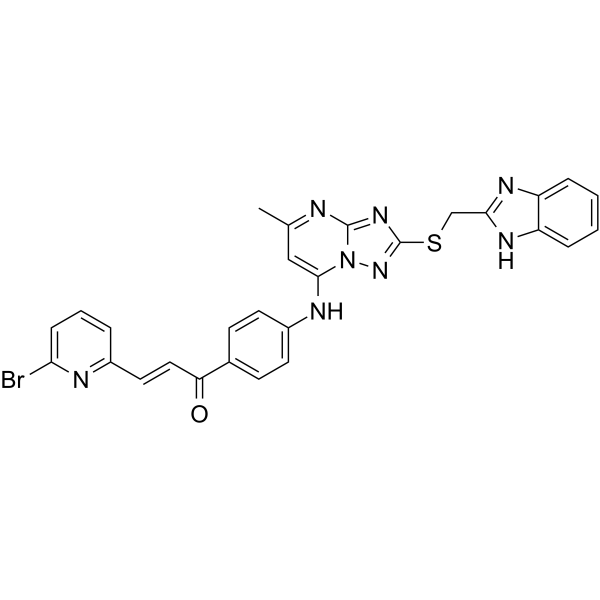
-
- HY-146040
-
|
|
Apoptosis
|
Cancer
|
|
Anticancer agent 47 (compound 4j) is a potent anticancer agent. Anticancer agent 47 shows antiproliferative activities. Anticancer agent 47 induces apoptosis and cell cycle arrest at G0/G1 phase. Anticancer agent 47 shows shows antitumor activities in vivo .
|
-
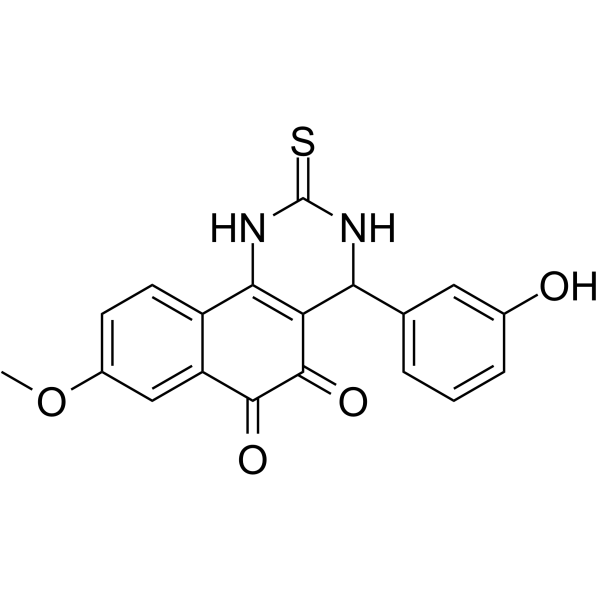
- HY-154861
-
|
|
Bacterial
Apoptosis
Necroptosis
|
|
|
Anticancer agent 118, a N‑acylated ciprofloxacin derivative, has anti-bacterial and anticancer activities. Anticancer agent 118 shows high activity against Gram-positive strains and antiproliferative activities against prostate PC3 cells. Anticancer agent 118 can be used for antitumor research .
|
-
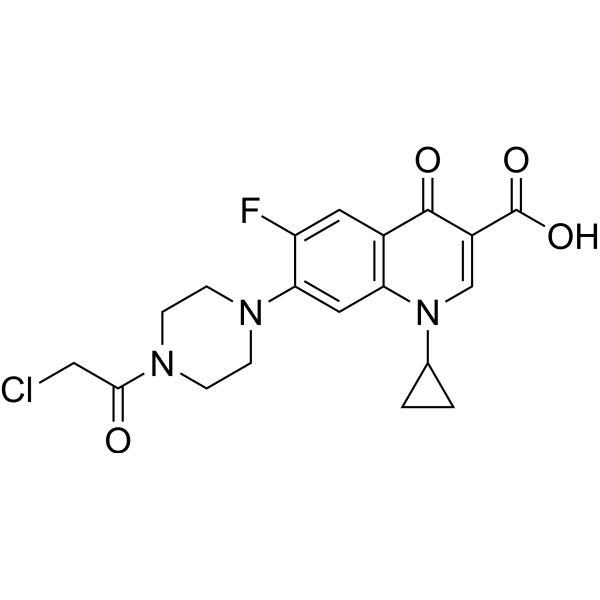
- HY-14307A
-
|
|
Others
|
Cancer
|
|
(R)-Necrocide 1 (compound (R)-38) a potent anticancer agent. (R)-Necrocide 1 has antiproliferative activity .
|
-
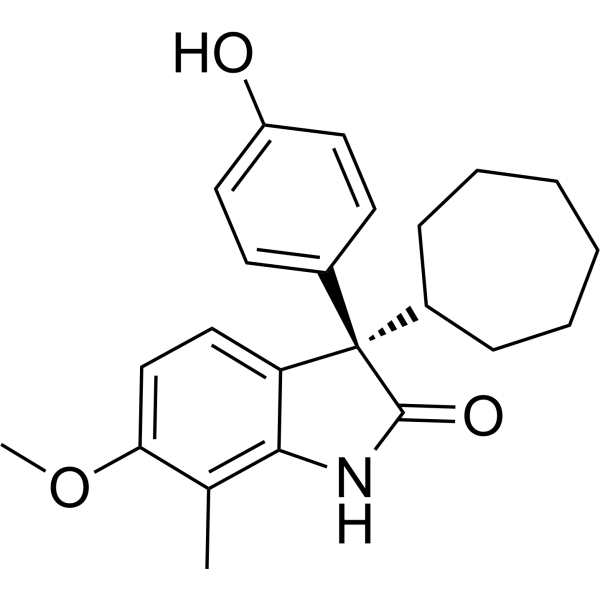
- HY-143462
-
|
|
HDAC
c-Met/HGFR
Apoptosis
|
Cancer
|
|
c-Met/HDAC-IN-2 is a highly potent c-Met and HDAC dual inhibitor with IC50s of 18.49 nM and 5.40 nM for HDAC1 and c-Met, respectively. c-Met/HDAC-IN-2 has antiproliferative activities against certain cancer cell lines. c-Met/HDAC-IN-2 can cause G2/M-phase arrest and induce apoptosis in HCT-116. c-Met/HDAC-IN-2 can be used for researching anti-cancer resistance .
|
-
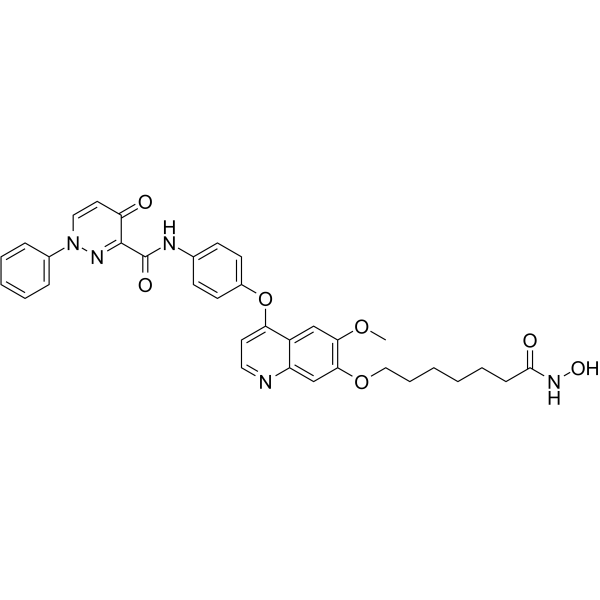
- HY-149832
-
|
|
Proteasome
|
Cancer
|
|
Anticancer agent 114 is a potent and orally active dipeptide boronic acid ester proteasome inhibitor with an IC50 value of 2.2 nM. Anticancer agent 114 has antiproliferative activity against the RPMI-8226 cells. Anticancer agent 114 can be used in research of multiple myeloma .
|
-
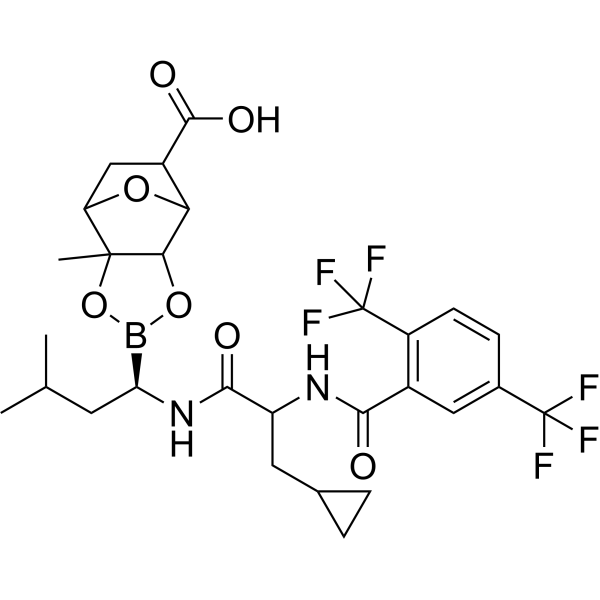
- HY-153469
-
|
|
ADC Cytotoxin
|
Cancer
|
|
Benzyl DC-81 (Compound 6a) is an anticancer agent with antiproliferative activity against A375 and MCF-7 cells .
|
-
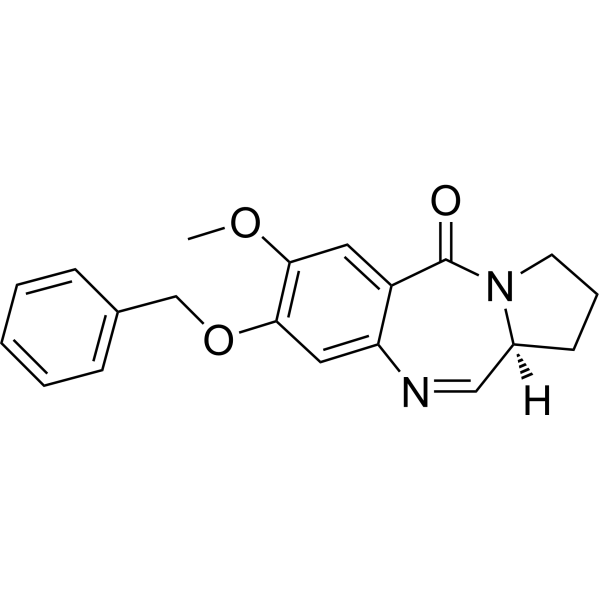
- HY-146389
-
|
|
MDM-2/p53
P-glycoprotein
|
Cancer
|
|
Anticancer agent 50 (compound 6) is a potent ABCB1 efflux pump modulator. Anticancer agent 50 shows cytotoxic effects and antiproliferative effects. Anticancer agent 50 decreases the expression of cyclin D1 and induces p53 expression. Anticancer agent 50 has the potential for the research of T-lymphoma .
|
-
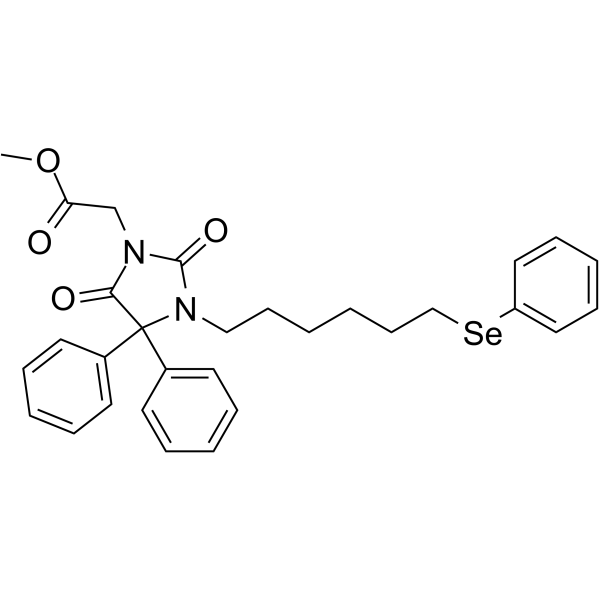
- HY-146467
-
|
|
Others
|
Cancer
|
|
Anticancer agent 62 (compound 4c) is a potent anticancer agent. Anticancer agent 62 shows antiproliferative activity in HepG2, Bel-7402 and MCF-7 cancer cells, with IC50 values of 0.019, 0.060 and 0.016 μM, respectively. Anticancer agent 62 shows effective tumor growth inhibition .
|
-
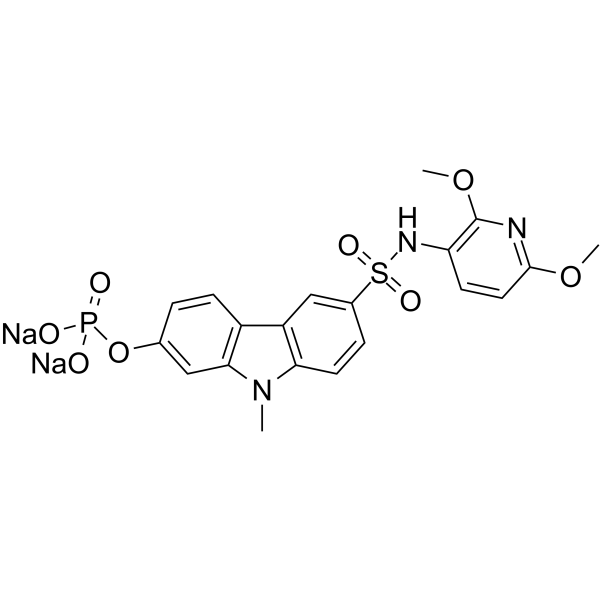
- HY-147906
-
|
|
Apoptosis
PARP
|
Cancer
|
|
Anticancer agent 71 (Compound 4b) is a potent anticancer agent and induces apoptosis. Anticancer agent 71 arrests cell cycle at G2/M phase and induces apoptosis through upregulating Bax, Ikb-α and cleaved PARP and downregulating Bcl-2 expression levels. Anticancer agent 71 shows antiproliferative activity .
|
-
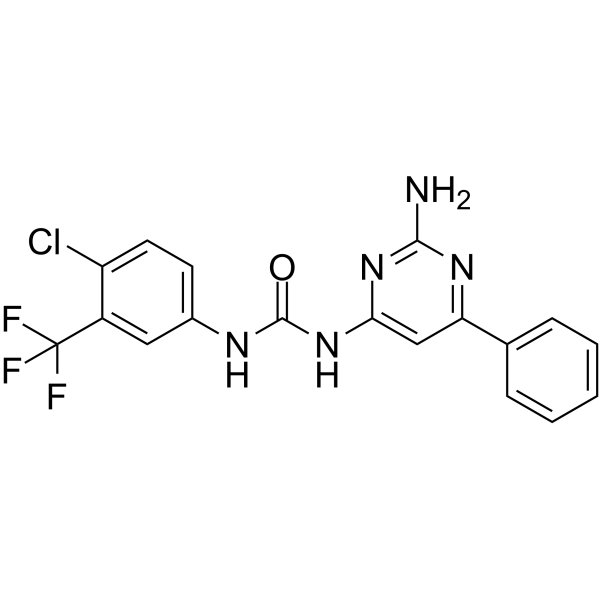
- HY-146466
-
|
|
Others
|
Cancer
|
|
Anticancer agent 61 (compound 3v) is an orally active and potent anticancer agent. Anticancer agent 61 shows antiproliferative activity in HepG2, Bel-7402 and MCF-7 cancer cells, with IC50 values of 1.12, 1.97 and 1.08 μM, respectively. Anticancer agent 61 shows effective tumor growth inhibition .
|
-
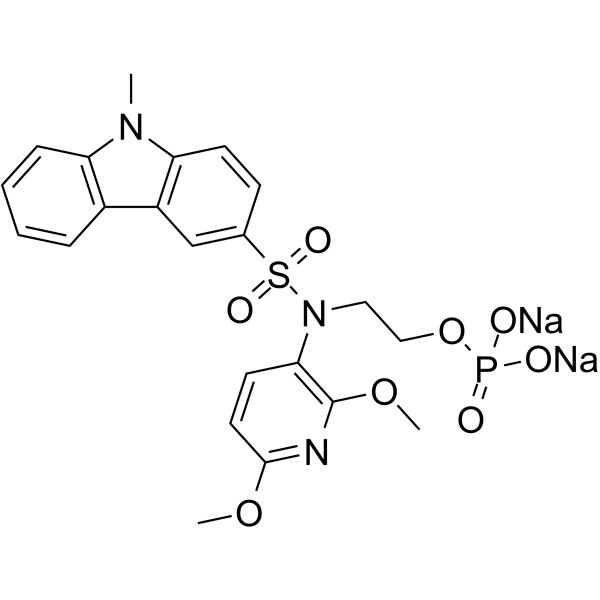
- HY-155112
-
|
|
Microtubule/Tubulin
FLT3
Bcr-Abl
|
Cancer
|
|
Antiproliferative agent-30 (Compound 8g) inhibits tubulin assembly and inhibits FLT3 and Abl1. Antiproliferative agent-30 has vascular-disrupting activity. Antiproliferative agent-30 has broad antiproliferative activities against cancer cell lines (IC50s: 0.054 nM, 0.008 nM, 0.144 nM for HCT-116, K562, MV-4-11 cells respectively). Antiproliferative agent-30 also has anticancer effect against AML with FLT3-ITD-TKD mutation .
|
-
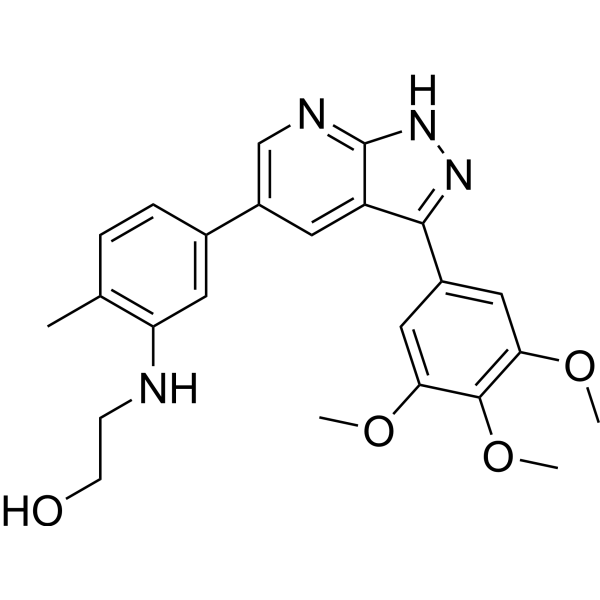
- HY-N6621
-
|
|
Topoisomerase
|
Cancer
|
|
Hippeastrine, an active alkaloid, exhibits a good dose-dependent inhibitory effect against topoisomerase I (Top I) with an IC50 at 7.25 μg/mL. Antiproliferative and anticancer activities .
|
-
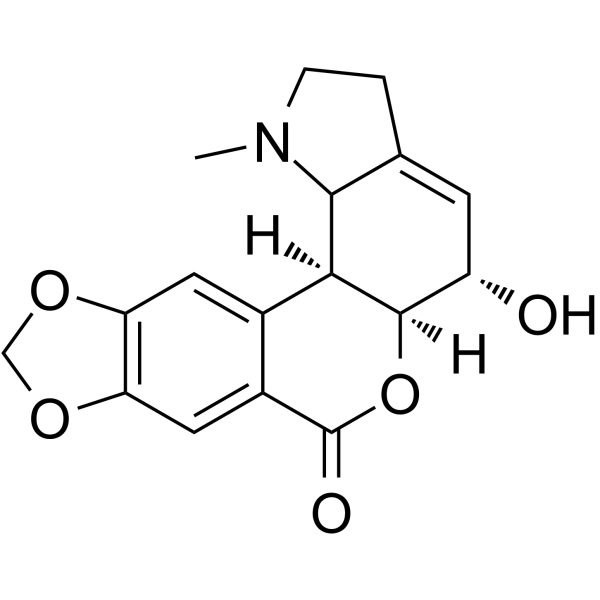
- HY-152247
-
|
|
MAP3K
|
Cancer
|
|
DDO3711, a PP5-recruiting phosphatase recruitment chimeras (PHORCs), is formed by connecting a small molecular apoptosis signal-regulated kinase 1 (ASK1) inhibitor to a PP5 activator through a chemical linker. DDO3711 specifically inhibits ASK1 (IC50 =164.1 nM) not ASK2 (IC50>20 μM). DDO3711 significantly dephosphorylates p-ASK1 T838 by recruiting PP5 and shows the ASK1-dependent antiproliferative activity. DDO3711 has anti-cancer activity and has the potential for abnormally phosphorylated oncoproteins research .
|
-
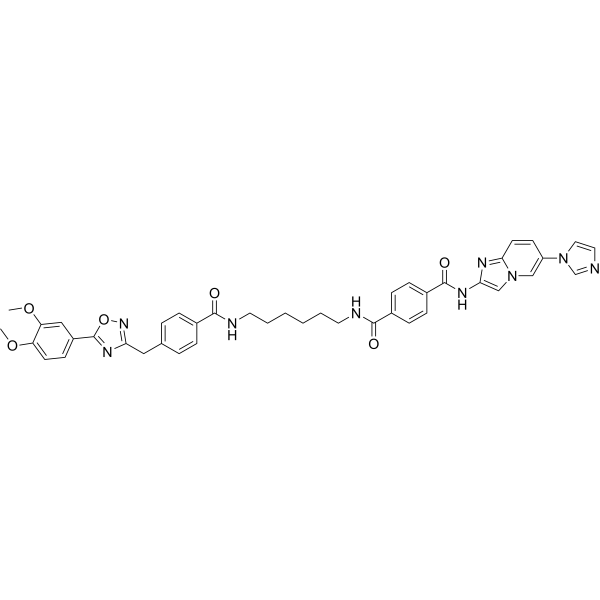
- HY-119502
-
|
|
Reactive Oxygen Species
Fungal
Bacterial
|
Infection
Cancer
|
|
Camalexin is a phytoalexin isolated from Camelina sativa (Cruciferae) with antibacterial, antifungal, antiproliferative and anticancer activities. Camalexin can induce reactive oxygen species (ROS) production .
|
-
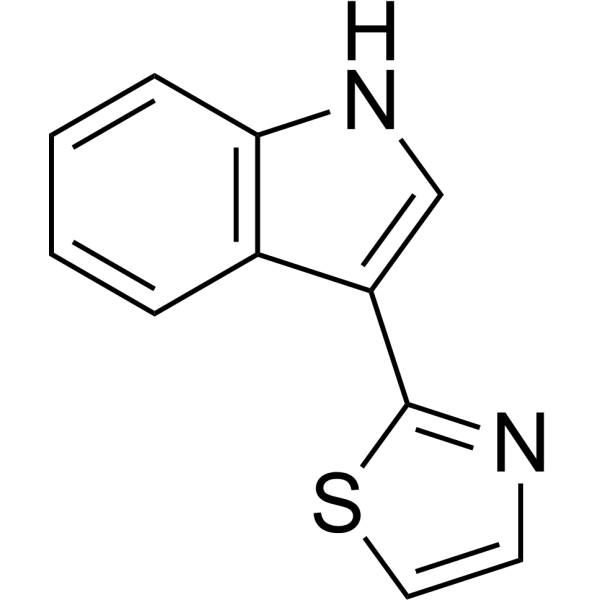
- HY-P2228
-
|
|
HDAC
Apoptosis
|
Cancer
|
|
Chlamydocin, a fungal metabolite, is a highly potent HDAC inhibitor, with an IC50 of 1.3 nM. Chlamydocin exhibits potent antiproliferative and anticancer activities. Chlamydocin induces apoptosis by activating caspase-3 .
|
-
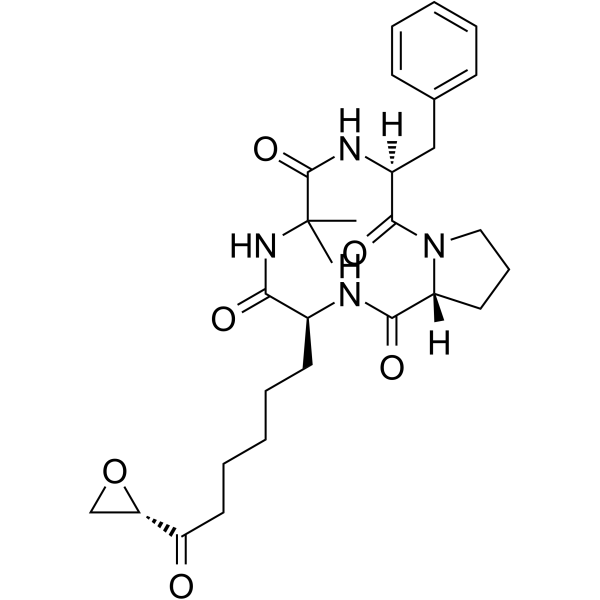
- HY-149920
-
|
|
Microtubule/Tubulin
|
Cancer
|
|
Anticancer agent 98 (compound 12k) is a microtubule/tubulin-polymerization inhibitor (Kd=16.9 μM). Anticancer agent 98 exerts antiproliferative potency against tumor cells, exhibits anti-angiogenesis effect in vitro. Anticancer agent 98 exhibits good human and mouse liver microsomes stability with both t1/2>300 min .
|
-
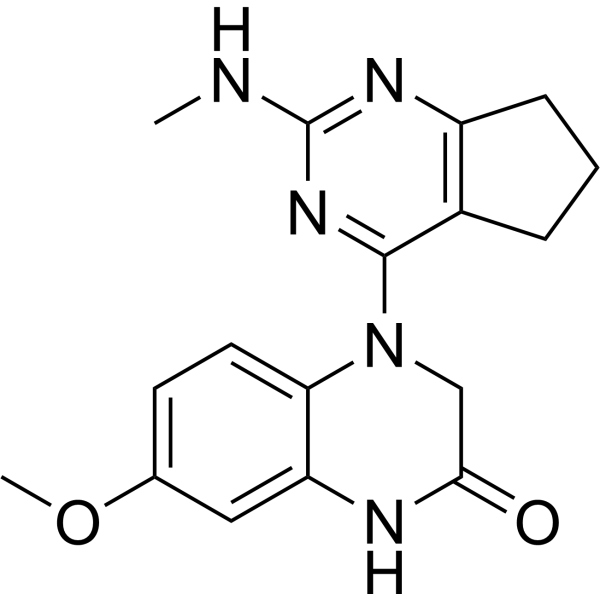
- HY-19896
-
COTI-2
2 Publications Verification
|
MDM-2/p53
Apoptosis
|
Cancer
|
|
COTI-2, an anti-cancer agent with low toxicity, is an orally available third generation activator of p53 mutant forms. COTI-2 acts both by reactivating mutant p53 and inhibiting the PI3K/AKT/mTOR pathway. COTI-2 induces apoptosis in multiple human tumor cell lines. COTI-2 exhibits antitumor activity in HNSCC through p53-dependent and -independent mechanisms. COTI-2 converts mutant p53 to wild-type conformation .
|
-
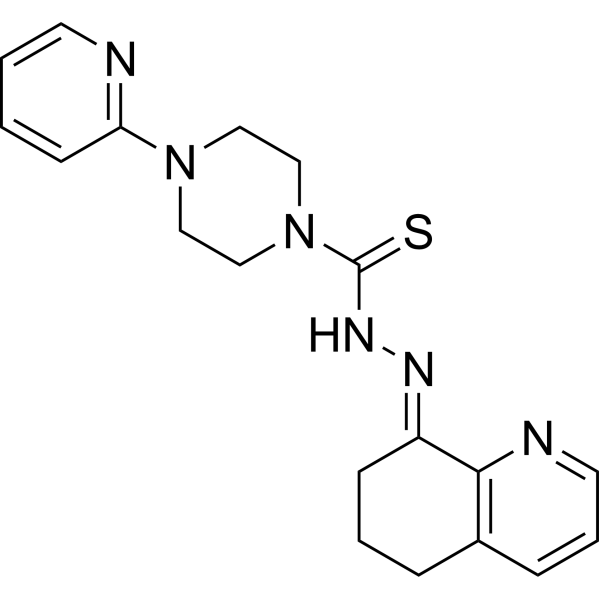
- HY-14307
-
|
|
Others
|
Cancer
|
|
Necrocide 1 (compound (S)-38) a potent anticancer agent. Necrocide 1 has antiproliferative activity with an IC50 value of 0.48 and 2 nM for MCF-7 and PC3, respectively .
|
-
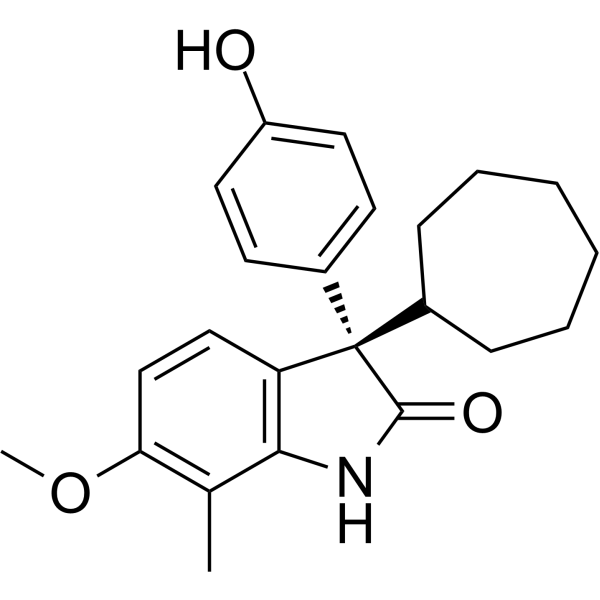
- HY-146465
-
|
|
Microtubule/Tubulin
|
Cancer
|
|
Anticancer agent 60 (compound 3h) has antiproliferative activity against human HepG2 cells (IC50 = 4.13 μM) and presents antitumor efficacy in a human HepG2 xenograft mouse model .
|
-
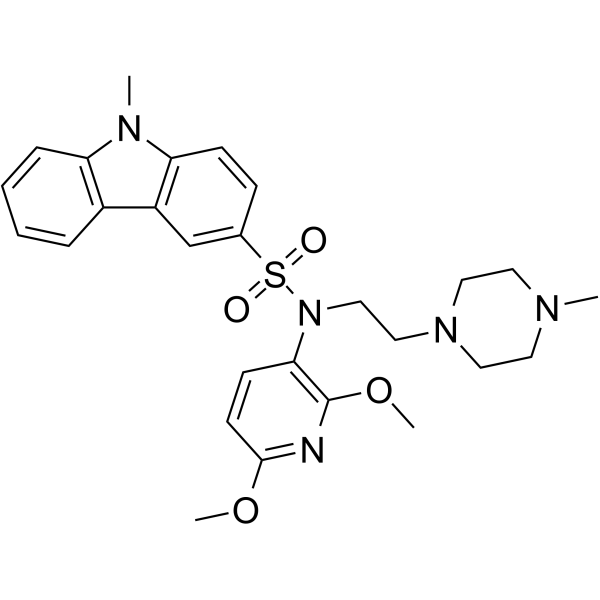
- HY-143253
-
|
|
Estrogen Receptor/ERR
|
Cancer
|
|
Estrogen receptor antagonist 7 (compound 13) is a potent estrogen receptors (ER) antagonist. Estrogen receptor antagonist 7 has antiproliferative activity against breast and ovarian cancer cells. Anticancer and anti-uterotrophic activities .
|
-
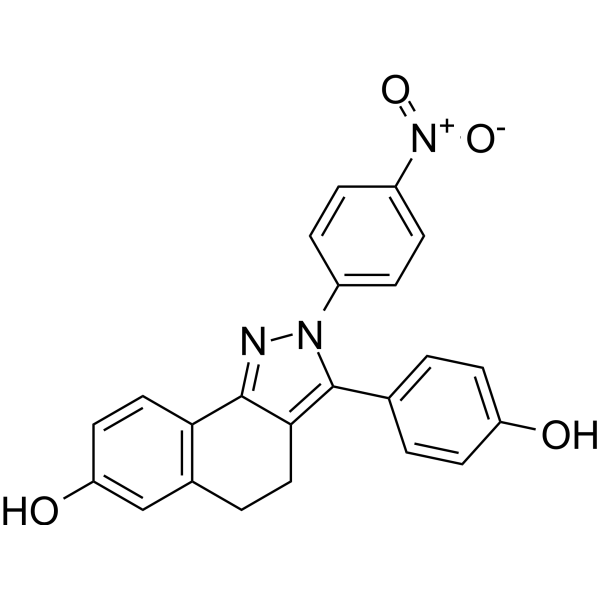
- HY-N2858
-
|
|
Apoptosis
|
Cancer
|
|
Alpinumisoflavone acetate is a anticancer agent. Alpinumisoflavone acetate shows antiproliferative activity. Alpinumisoflavone acetate decreases the expression of phosphorylation of ERK1/2. Alpinumisoflavone acetate induces mitochondrial dysfunction and mitochondria-mediated Apoptosis. Alpinumisoflavone acetate has the potential for the research of HCC .
|
-
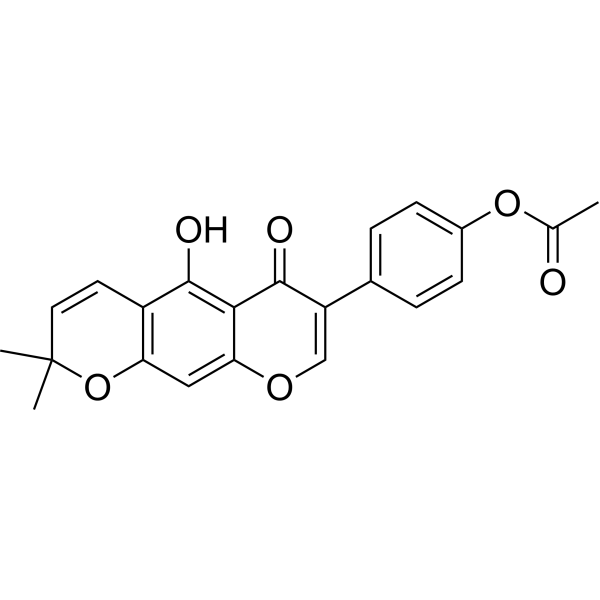
- HY-N11050
-
|
|
Apoptosis
|
Cancer
|
|
Xerophilusin B, an anticancer agent isolated from Isodon xerophilus, exhibits antiproliferative effects on esophageal squamous cell carcinoma (ESCC) cell lines, induces G2/M cell cycle arrest, and mediates apoptosis .
|
-
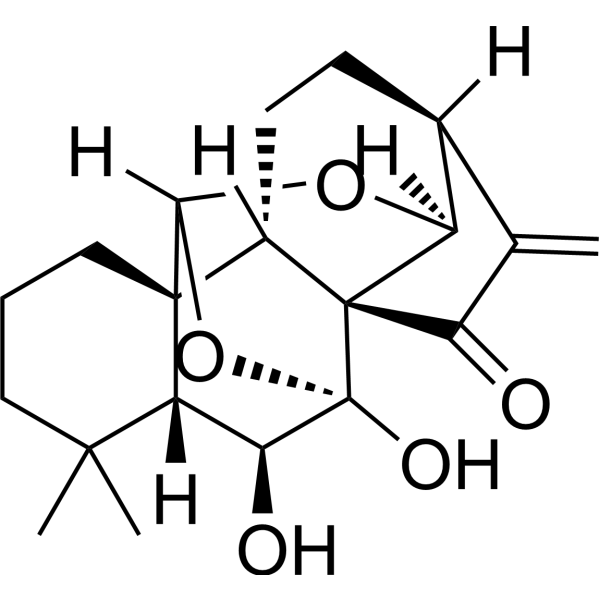
- HY-W016889
-
|
|
Ras
|
Cancer
|
|
CFL-137 is a potent KRas G12C inhibitor. CFL-137 shows an antiproliferative effect. CFL-137 shows anticancer activity. CFL-137 has the potential for the research of lung cancer .
|
-
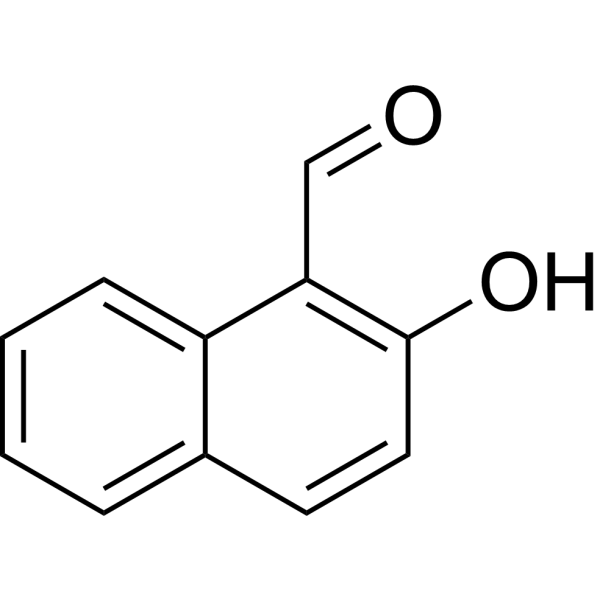
- HY-W041315
-
|
|
Ras
|
Cancer
|
|
CFL-120 is a potent KRas G12C inhibitor. CFL-120 shows an antiproliferative effect. CFL-120 shows anticancer activity. CFL-120 has the potential for the research of lung cancer .
|
-
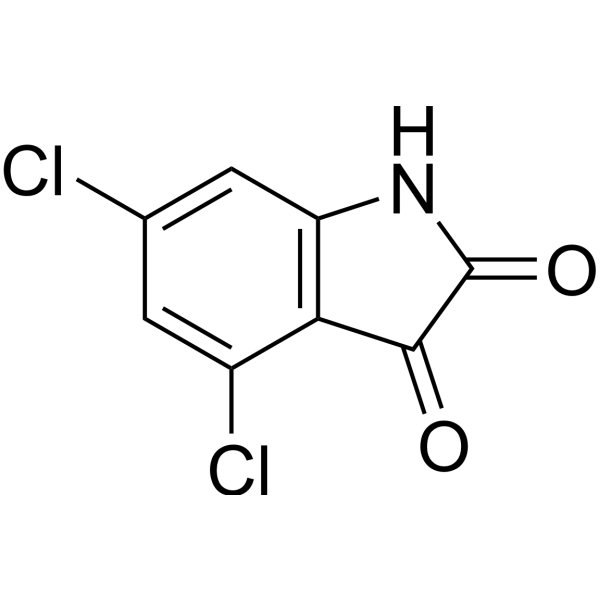
- HY-132578
-
|
|
Phosphatase
|
Cancer
|
|
M5N36 is a potent and selective Cdc25C inhibitor with IC50 values of 0.15, 0.19, 0.06 µM for Cdc25A, Cdc25B, Cdc25C, respectively. M5N36 shows anti-proliferative activity and increases the expression of p-CDK1 and p-CDK2 .
|
-
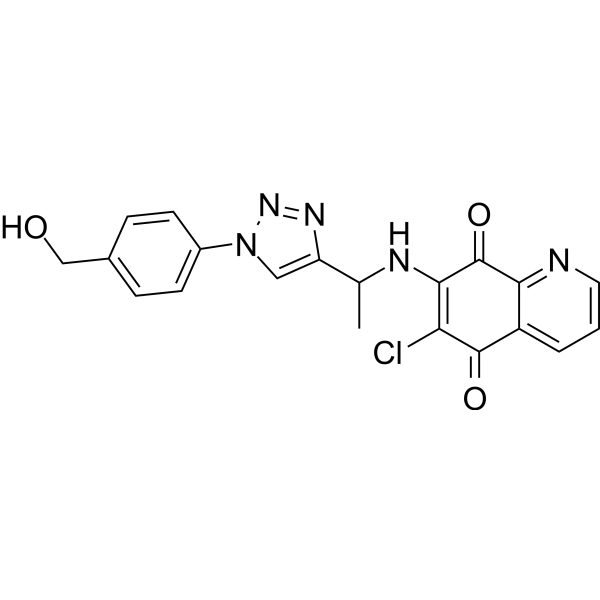
- HY-157044
-
|
|
Bacterial
|
Infection
Cancer
|
|
Antibacterial agent 162 trifluoromethanesulfonate (compound 7) is an antibacterial agent that exhibits potent inhibitory activity against Staphylococcus aureus, including MRSA. Antibacterial agent 162 trifluoromethanesulfonate is also an anticancer agent and exhibits antiproliferative activity against colon cancer and non-small cell lung cancer cells. Antibacterial agent 162 trifluoromethanesulfonate can be used in anticancer and antibacterial research .
|
-
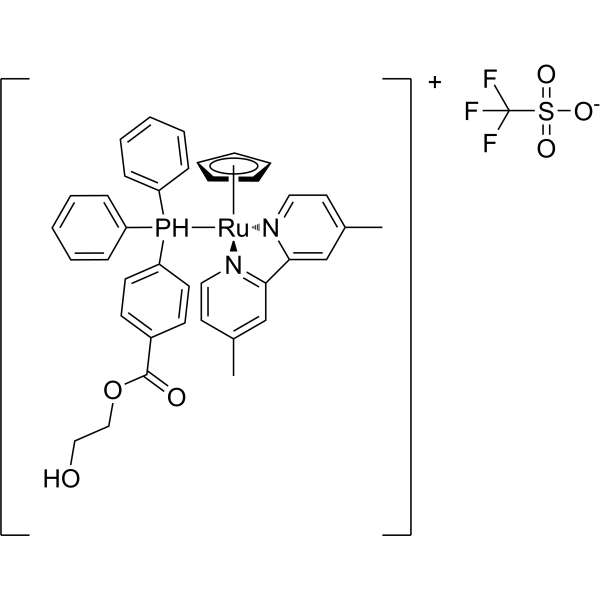
- HY-150564
-
|
|
Smo
Hedgehog
|
Cancer
|
|
SMO-IN-2 (compound 1) is a potent smoothened (SMO) inhibitor with an IC50 value of 123.4 nM for hedgehog (Hh) signaling pathway. SMO-IN-2 has antiproliferative activity against human medulloblastoma cell line Daoy. Anticancer activity .
|
-
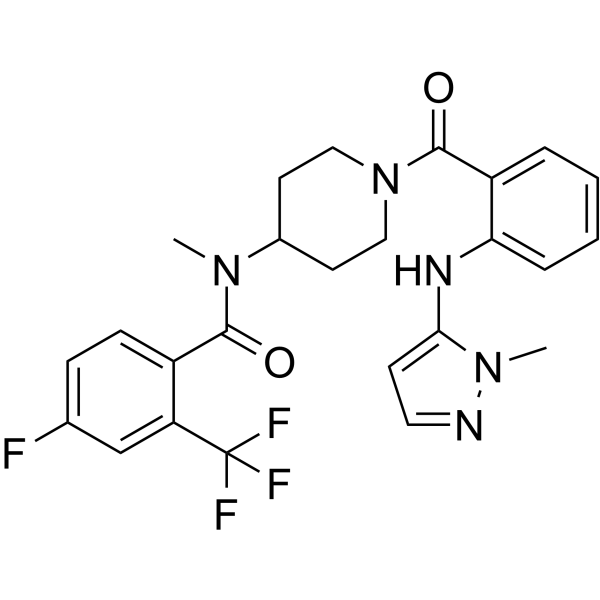
- HY-150567
-
|
|
Smo
Hedgehog
|
Cancer
|
|
SMO-IN-3 (compound 12a) is a potent smoothened (SMO) inhibitor with an IC50 value of 34.09 nM for hedgehog (Hh) signaling pathway. SMO-IN-3 has antiproliferative activity against human medulloblastoma cell line Daoy. Anticancer activity .
|
-
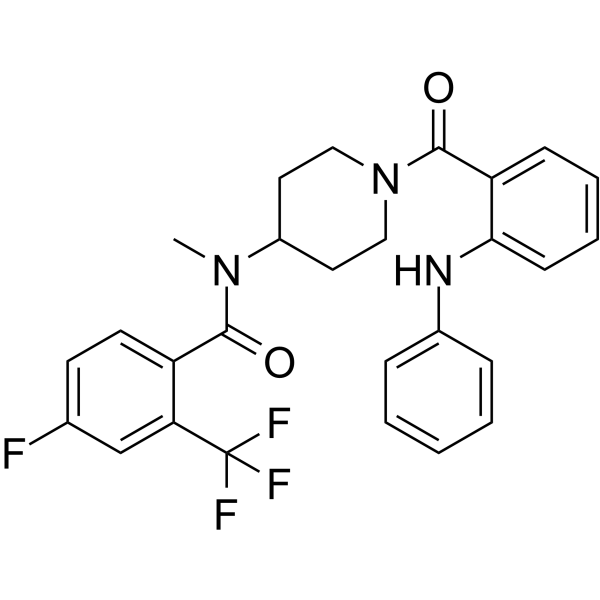
- HY-149033
-
|
|
Others
|
Cancer
|
|
Kobusine derivative-2, a kobusine derivative, has antiproliferative activity against cancer cells. Kobusine derivative-2 can induce the arrest of MDA-MB-231 cells in the sub-G1 phase. Anticancer activity .
|
-
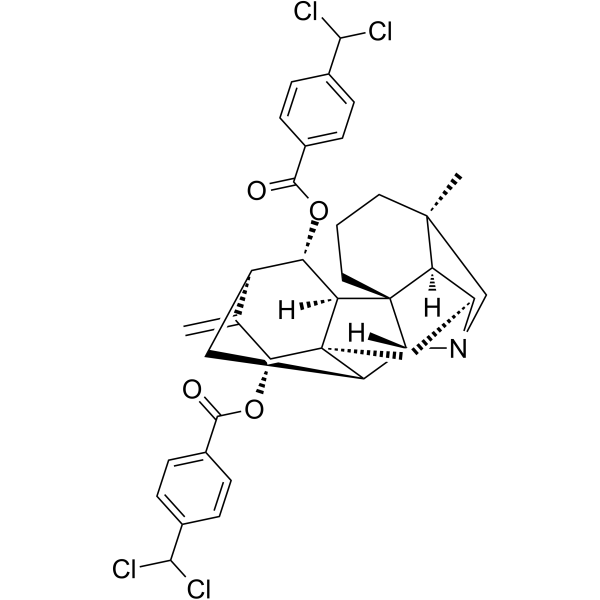
- HY-131923
-
|
|
Notch
|
Cancer
|
|
DAPM is a Notch pathway inhibitor with anticancer activity and antiproliferative effects. DAPM effectively inhibits tubular adenoma development by inhibiting cell proliferation and inducing the expression of Krüppel-like factor 4 (KLF4) and p21 in human colon cancer cells .
|
-
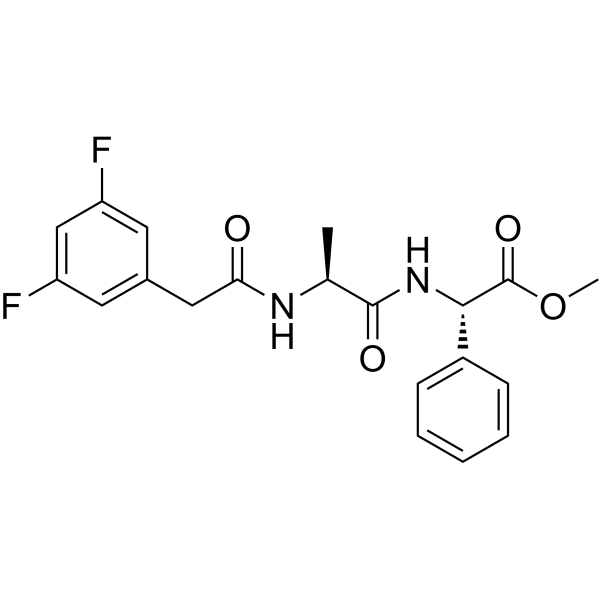
- HY-146096
-
|
|
P-glycoprotein
Apoptosis
|
Cancer
|
|
RMS3, a tetrandrine analogue, is a potent P-glycoprotein (P-gp) inhibitor. RMS3 has markedly antiproliferative and cytotoxic effects on cancer cells. RMS3 causes PARP cleavage, a marker for cells undergoing apoptosis. RMS3 has strong anticancer property .
|
-
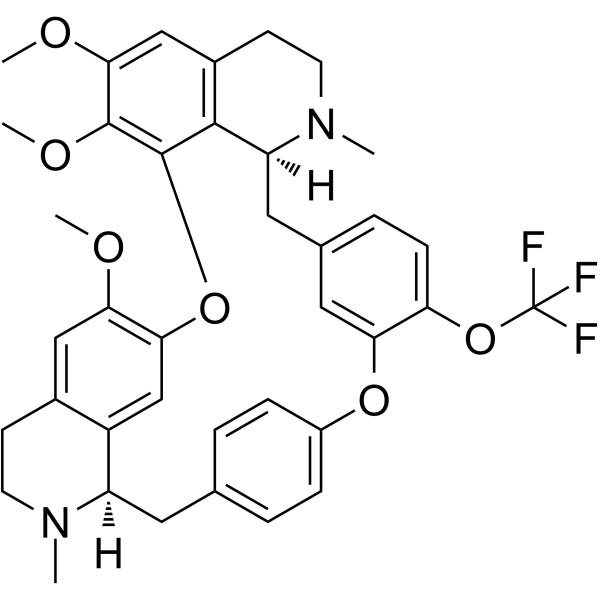
- HY-N6005
-
|
|
Bacterial
|
Infection
Cancer
|
|
Methyl caffeate, an antimicrobial agent, shows moderate antimicrobial and prominent antimycobacterial activities. Methyl caffeate also exhibits α-glucosidase inhibition activity, oxidative stress inhibiting activity, anti-platelet activity, antiproliferative activity in cervix adenocarcinoma and anticancer activity in lung and leukmia cell lines .
|
-
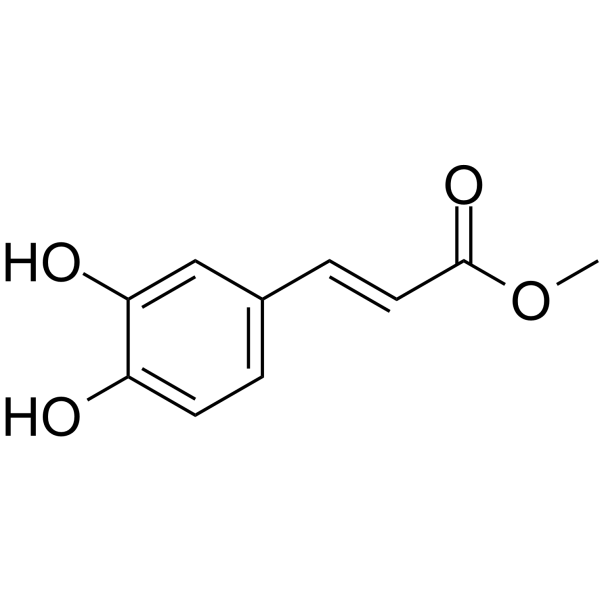
- HY-N10355
-
|
|
Apoptosis
|
Cancer
|
27-TBDMS-4-Dehydrowithaferin A, a withaferin A derivative, exhibits potent antiproliferative effects on the tumor cells.27-TBDMS-4-Dehydrowithaferin A induces tumor cells apoptosis. 27-TBDMS-4-Dehydrowithaferin A is a anticancer agent .
|
-
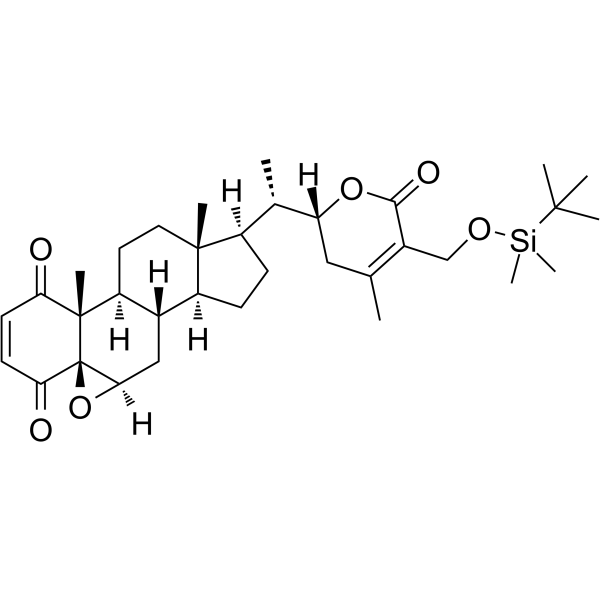
- HY-148740
-
|
|
DNA/RNA Synthesis
|
Cancer
|
|
Werner syndrome RecQ helicase-IN-3 is a potent and orally active werner syndrome recQ helicase (WRN) inhibitor with an IC50 value of 0.06 µM. Werner syndrome RecQ helicase-IN-3 shows antiproliferative activity. Werner syndrome RecQ helicase-IN-3 shows anticancer activity .
|
-
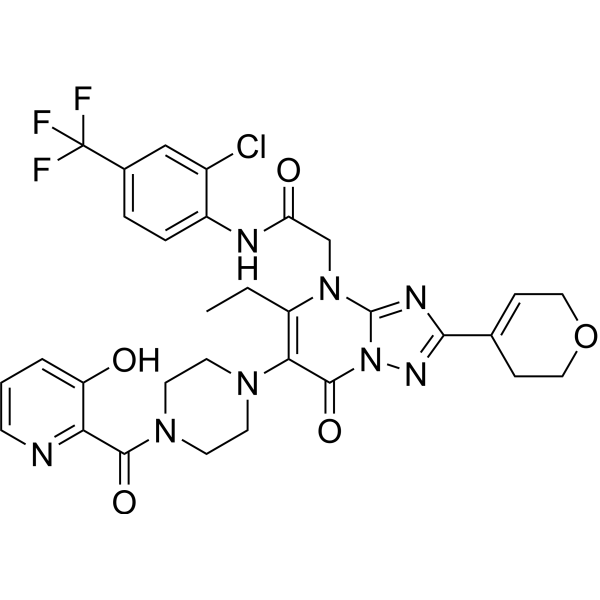
- HY-148741
-
|
|
DNA/RNA Synthesis
|
Cancer
|
|
Werner syndrome RecQ helicase-IN-4 is a potent and orally active werner syndrome recQ helicase (WRN) inhibitor with an IC50 value of 0.06 µM. Werner syndrome RecQ helicase-IN-4 shows antiproliferative activity. Werner syndrome RecQ helicase-IN-4 shows anticancer activity .
|
-
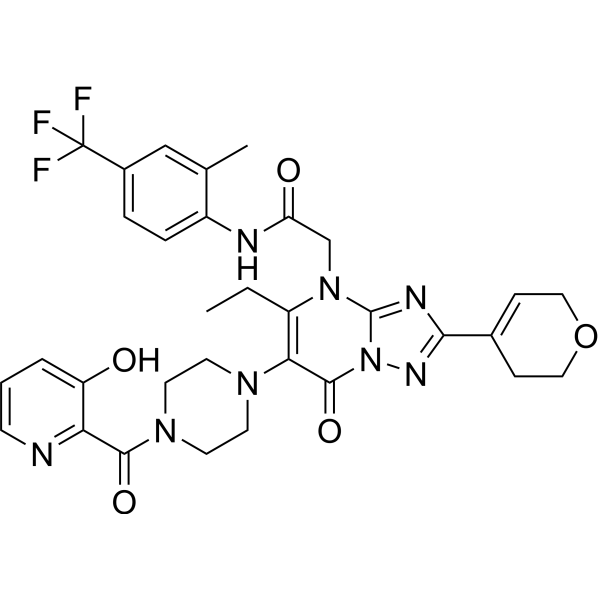
- HY-15228
-
RX-3117
1 Publications Verification
TV-1360; Fluorocyclopentenylcytosine
|
Nucleoside Antimetabolite/Analog
Apoptosis
|
Cancer
|
|
RX-3117 (TV-1360) is a potent and orally active anticancer and antimetaboliteagent. RX-3117 inhibits DNA methyltransferase 1 (DNMT1). RX-3117 shows antiproliferative and anti-tumour activity. RX-3117 induces cell cycle arrest at S phase and apoptosis .
|
-
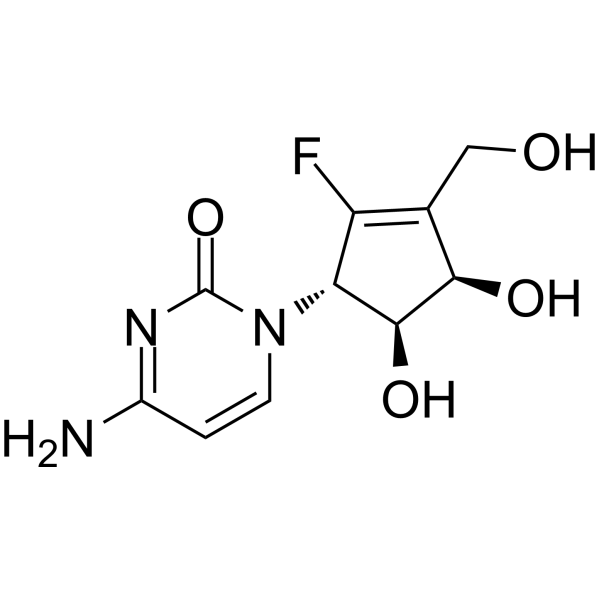
- HY-122727
-
|
|
DNA-PK
Apoptosis
|
Cancer
|
|
STL127705 (Compound L) is a potent Ku 70/80 heterodimer protein inhibitor with an IC50 of 3.5 μM. STL127705 interferes the binding of Ku70/80 to DNA and by inhibits the activation of the DNA-PKCS kinase. STL127705 shows antiproliferative and anticancer activity. STL127705 induces apoptosis .
|
-
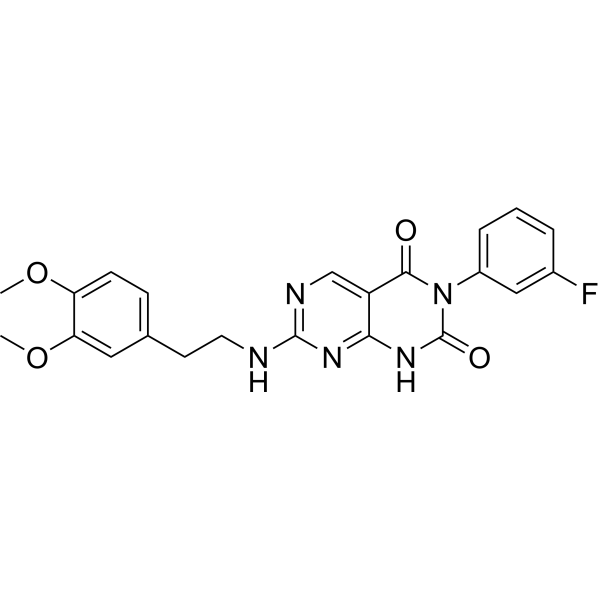
- HY-147290
-
|
|
Histone Acetyltransferase
|
Cancer
|
|
NSC 694623 is a potent histone acetyltransferase (HAT) inhibitor with an IC50 value of 15.9 μM for recombinant HAT p300/CBP-associated factor (PCAF). NSC 694623 has antiproliferative activity against certain cancer cells. NSC 694623 can be used for researching anticancer .
|
-
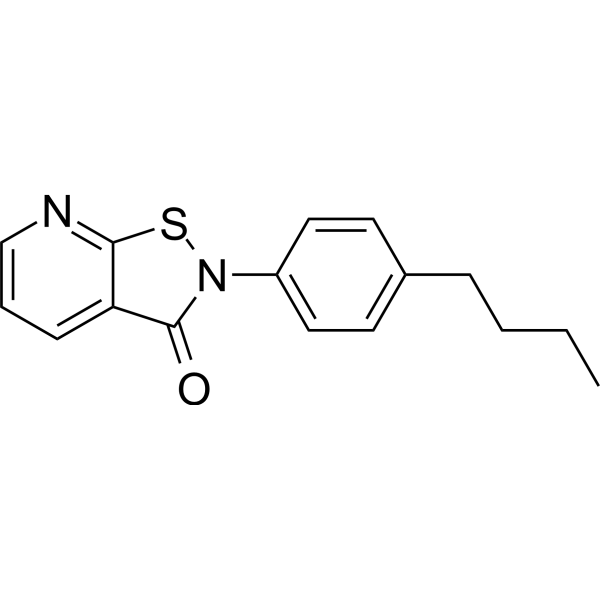
- HY-124745
-
|
|
MAP4K
Wnt
Apoptosis
|
Cancer
|
|
KY-05009 is an ATP-competitive Traf2- and Nck-interacting kinase (TNIK) inhibitor with a Ki of 100 nM. KY-05009 pharmacologically inhibits TGF-β1-induced epithelial-to-mesenchymal transition (EMT) in human lung adenocarcinoma cells. KY-05009 inhibits the protein expression of TNIK and transcriptional activity of Wnt target genes and induces apoptosis in cancer cells. KY-05009 exerts anti-cancer activity .
|
-
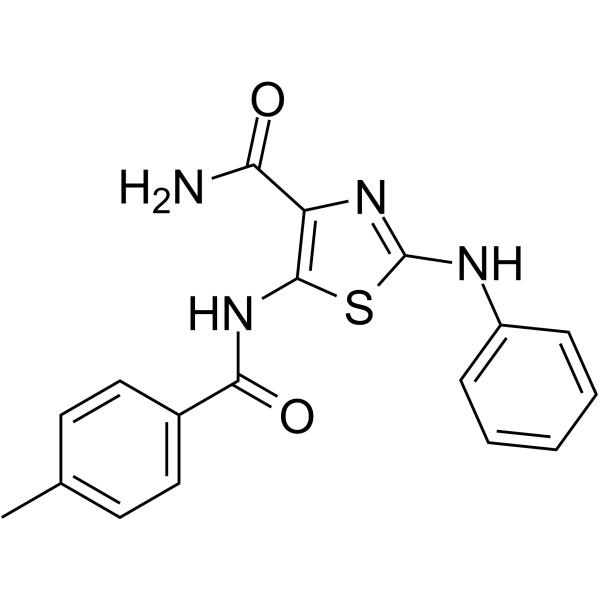
- HY-129476
-
|
|
Parasite
Endogenous Metabolite
|
Infection
Cancer
|
|
L-Canaline is a nonprotein amino acid stored in many leguminous plants. L-Canaline is a cytotoxic metabolite catalyzed by L-canavanine and its arginase. L-Canaline is a potent and irreversible inhibitor of ornithine aminotransferase. L-Canaline inhibits the growth of the malaria parasite Plasmodium falciparum with an IC50 of 297 nM. L-Canaline has anticancer and antiproliferative effects .
|
-
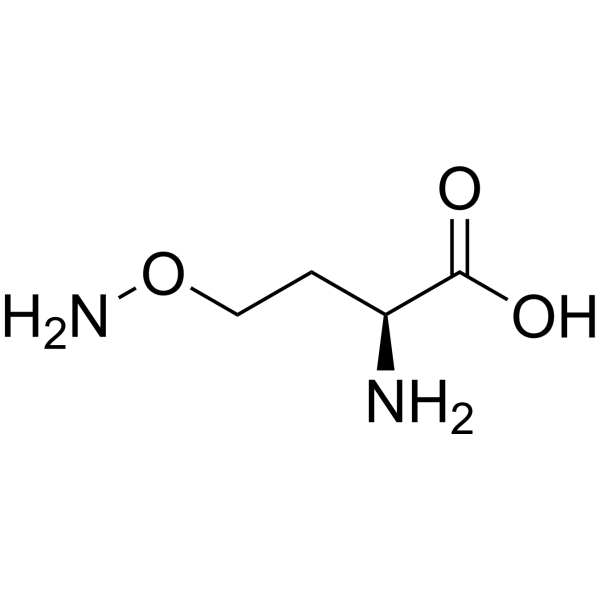
- HY-N10354
-
|
|
Apoptosis
|
Cancer
|
|
27-Methyl withaferin A (comppund 26) is an apoptosis inducer with anticancer effects. 27-Methyl withaferin A shows antiproliferative effects against HeLa, A-549 and MCF-7 human tumor cell lines with IC50 values of 3.2 μM, 4.2 μM and 1.4 μM, respectively .
|
-
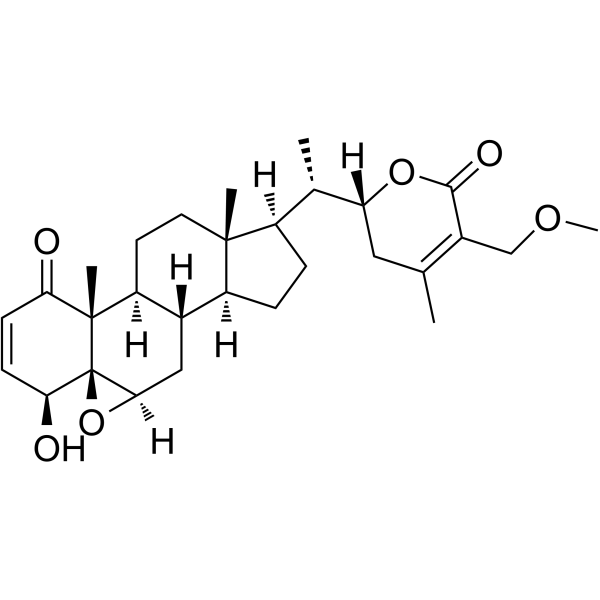
- HY-116035
-
|
|
NF-κB
CDK
Apoptosis
|
Cancer
|
|
Nimbolide is a triterpene compound that can be isolated from neem (Azadirachta indica), possesses anticancer and antiproliferative activity. Nimbolide induces tumor cell apoptosis by inhibiting NF-κB and CDK4/CDK6 kinase. Nimbolide suppresses the Wnt, PI3K-Akt, MAPK and JAK-STAT signaling pathways .
|
-
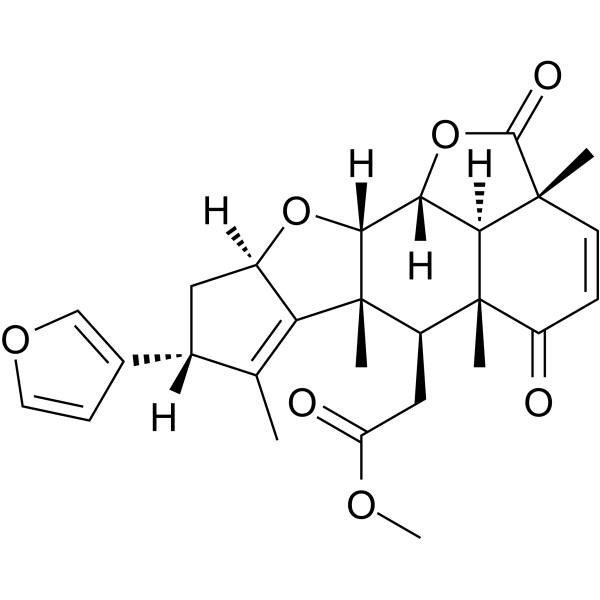
- HY-110002
-
|
|
Polo-like Kinase (PLK)
Btk
JAK
|
Cancer
|
|
LFM-A13 is a potent BTK, JAK2, PLK inhibitor, inhibits recombinant BTK, Plx1 and PLK3 with IC50s of 2.5 μM, 10 μM and 61 μM. LFM-A13 has antiproliferative activity and anticancer activity. LFM-A13 can be used in cancer-related research
|
-
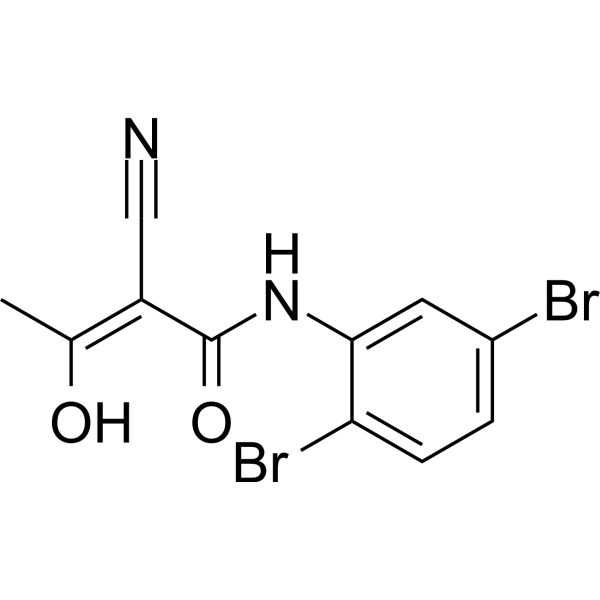
- HY-18979
-
|
|
|
|
|
Lactimidomycin is a glutarimide-containing compound isolated from Streptomyces. Lactimidomycin is a potent inhibitor of eukaryotic translation elongation. Lactimidomycin has a potent antiproliferative effect on tumor cell lines and selectively inhibit protein translation. Lactimidomycin inhibits protein synthesis with an IC50 value of 37.82 nM. Lactimidomycin is also a potent and non-toxic inhibitor of dengue virus 2 and other RNA viruses. Anticancer and antiviral activities .
|
-
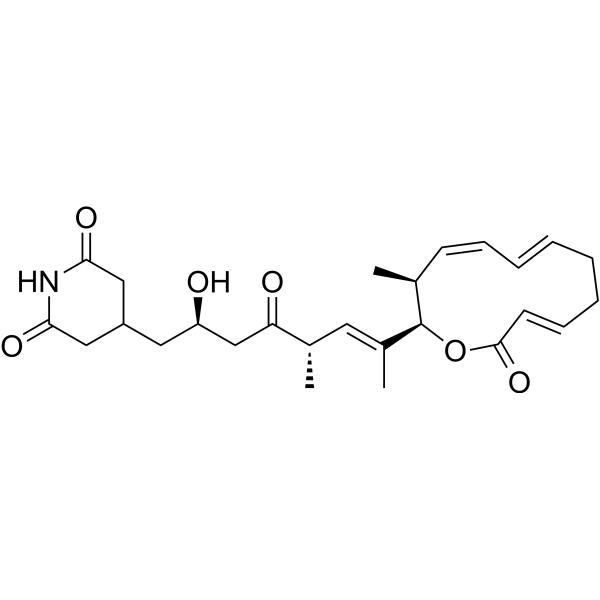
- HY-146287
-
|
|
DNA/RNA Synthesis
Apoptosis
|
Cancer
|
|
Zn(BQTC) is a highly potent mitochondrial DNA (mtDNA) and nuclear DNA (nDNA) inhibitor. Zn(BQTC) causes severe damage to the mtDNA and nDNA, sequentially disruptes mitochondrial and nuclear functions. Zn(BQTC) promotes the DNA damage-induced apoptotic signaling pathway. Zn(BQTC) has selectively antiproliferative activity against A549R cells. Zn(BQTC) can be used for researching anticancer .
|
-
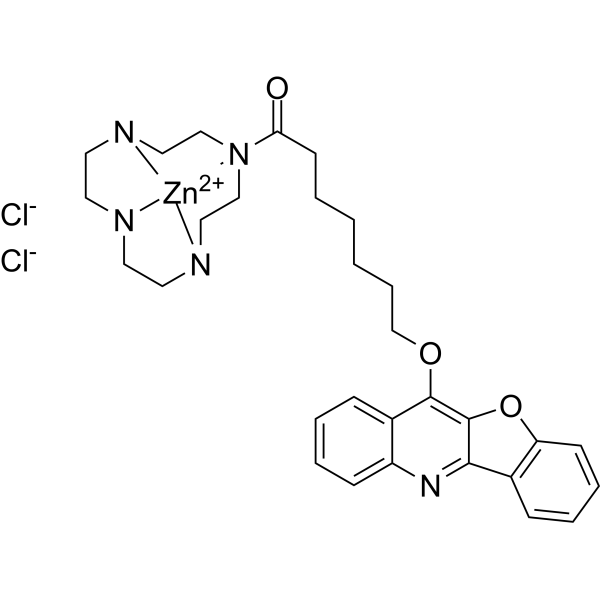
- HY-146097
-
|
|
P-glycoprotein
Apoptosis
|
Cancer
|
|
RMS5, a tetrandrine analogue, is a potent P-glycoprotein (P-gp) inhibitor. RMS5 has markedly antiproliferative and cytotoxic effects on cancer cells. RMS5 slightly diminishes the expression of the anti-apoptotic Bcl-2 family proteins Bcl-XL and Mcl-1. RMS3 causes PARP cleavage, a marker for cells undergoing apoptosis. RMS5 has strong anticancer property .
|
-
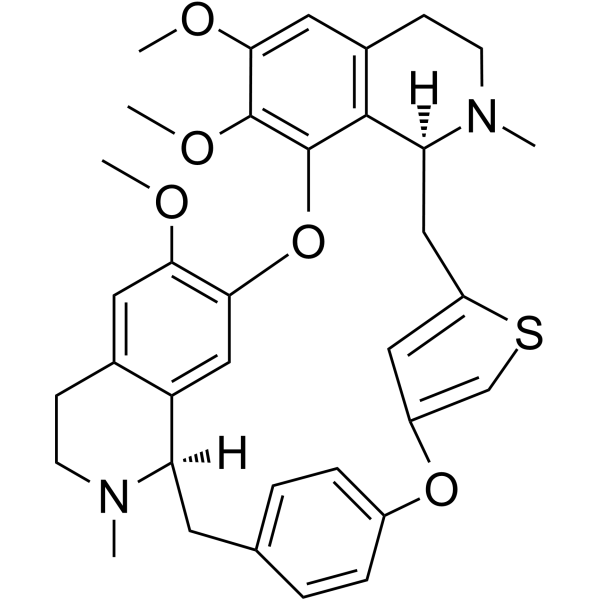
- HY-115589
-
|
|
Polo-like Kinase (PLK)
Apoptosis
|
Cancer
|
|
YLT-11 is a potent, selective and orally active PLK4 inhibitor with Kd values of >10000, 653, >10000, 5.2 nM for PLK1, PLK2, PLK3, PLK4, respectively. YLT-11 shows antiproliferative activity. YLT-11 induces Apoptosis and cell cycle arrest at G2/M phase. YLT-11 show anticancer activity .
|
-
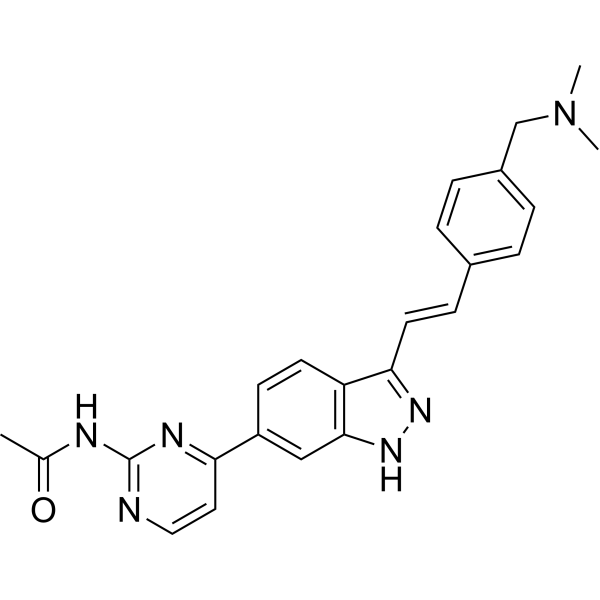
- HY-126052
-
|
|
COX
Tyrosinase
HDAC
|
Metabolic Disease
Cancer
|
|
Gnetol is a phenolic compound isolated from the root of Gnetum montanum . Gnetol potently inhibits COX-1 (IC50 of 0.78 μM) and HDAC. Gnetol is a potent tyrosinase inhibitor with an IC50 of 4.5 μM for murine tyrosinase and suppresses melanin biosynthesis. Gnetol has antioxidant, antiproliferative, anticancer and hepatoprotective activity. Gnetol also possesses concentration-dependent α-Amylase, α-glucosidase, and adipogenesis activities .
|
-
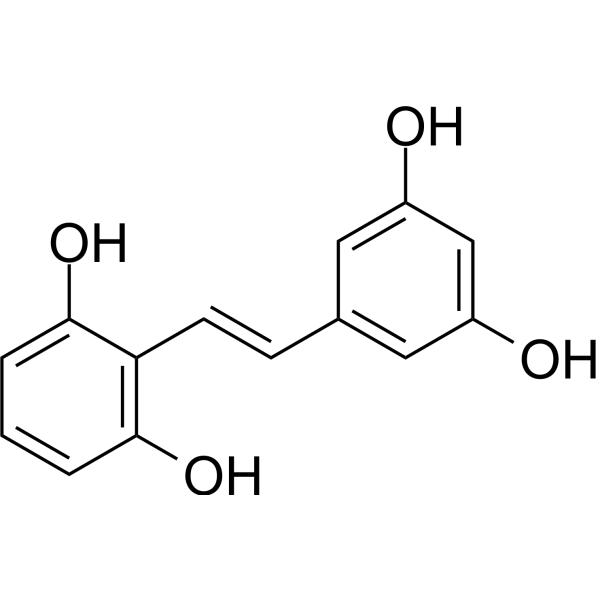
- HY-146683
-
|
|
Aldehyde Dehydrogenase (ALDH)
Apoptosis
|
Cancer
|
|
KS106 is a potent ALDH inhibitor with IC50s of 334, 2137, 360 nM for ALDH1A1, ALDH2, and ALDH3A1, respectively. KS106 shows antiproliferative and anticancer effects with low low toxic.KS106 significantly increases ROS activity, lipid peroxidation and toxic aldehyde accumulation. KS106 induces apoptosis and cell cycle arrest at the G2/M phase .
|
-
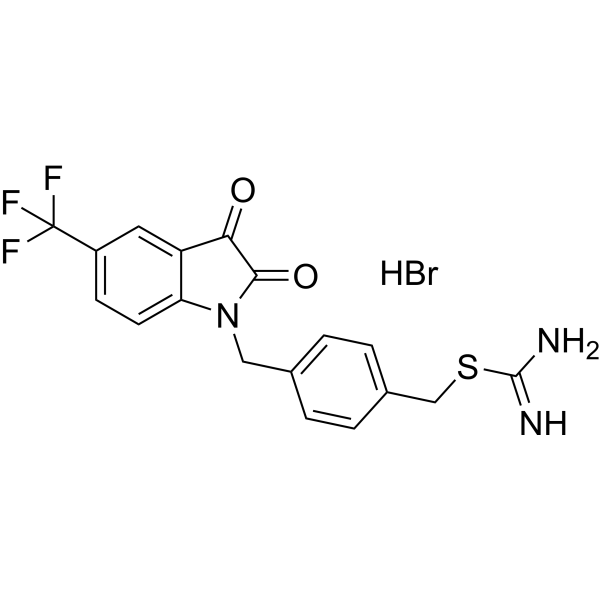
- HY-146682
-
|
|
Aldehyde Dehydrogenase (ALDH)
Apoptosis
|
Cancer
|
|
KS100 is a potent ALDH inhibitor with IC50s of 230, 1542, 193 nM for ALDH1A1, ALDH2, and ALDH3A1, respectively. KS100 shows antiproliferative and anticancer effects with low low toxic. KS100 significantly increases ROS activity, lipid peroxidation and toxic aldehyde accumulation. KS10600 induces apoptosis and cell cycle arrest at the G2/M phase .
|
-
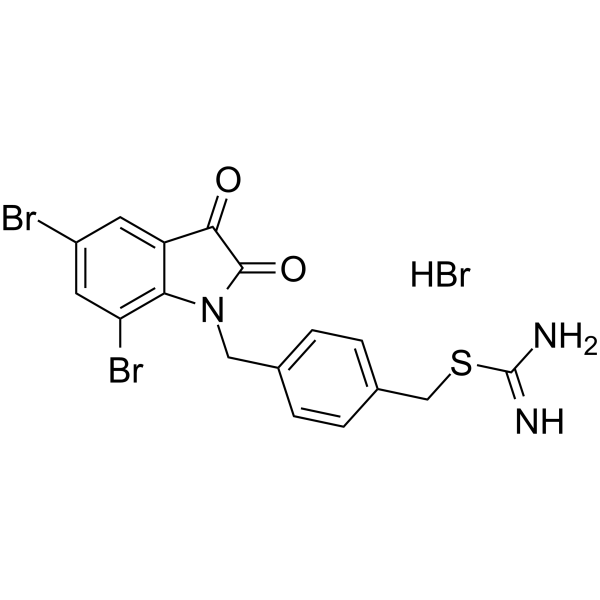
- HY-149558
-
|
|
Apoptosis
CXCR
|
Cancer
|
|
CXCR4-IN-2 (compound A1) is a bifunctional fluorinated small molecule that is a potent CXCR4 inhibitor with anticancer activity. CXCR4-IN-2 has cytotoxic (IC50: 60 μg/mL; 72 h) and antiproliferative effects on mouse colorectal cancer (CRC) cells. CXCR4-IN-2 induces cell arrest in the G2/M phase and induces apoptosis .
|
-
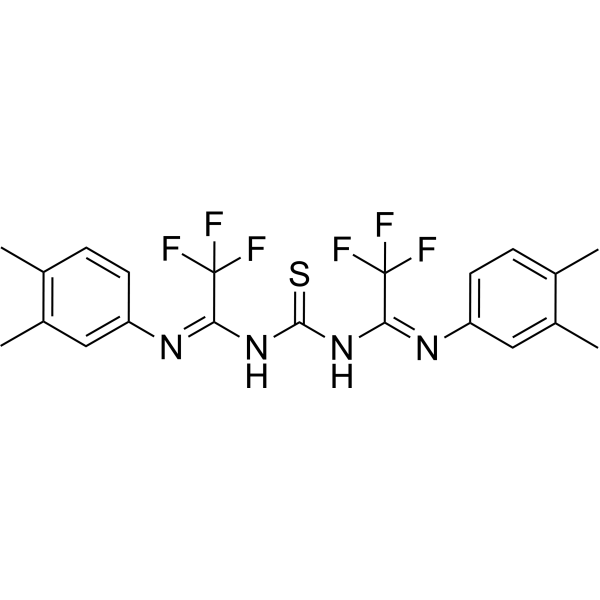
- HY-103387
-
|
|
COX
Apoptosis
|
Inflammation/Immunology
Cancer
|
|
DuP-697 is a member of the vicinal diaryl heterocycles and a potent, irreversible, selective and orally active COX-2 inhibitor (IC50 of 10 nM and 800 nM for human COX-2 and COX-1, respectively). DuP-697 exerts antiproliferative (IC50 of 42.8 nM), antiangiogenic and apoptotic effects on HT29 colorectal cancer cells. DuP-697 inhibits prostaglandin synthesis and has anti-inflammatory, anticancer and antipyretic effects .
|
-
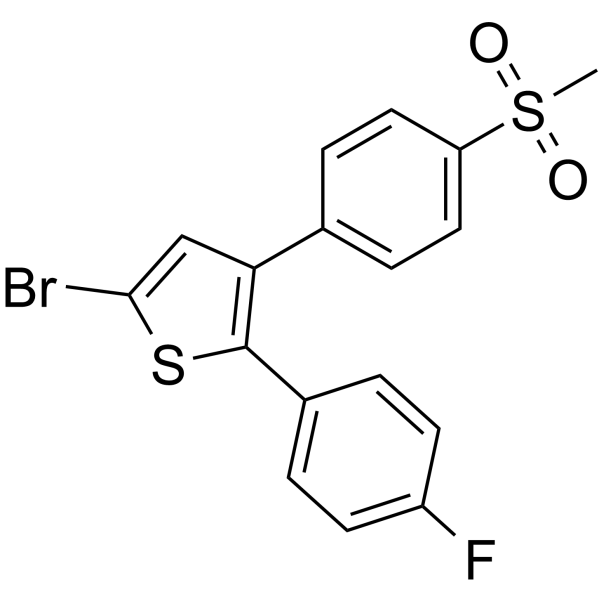
- HY-157317
-
|
|
Apoptosis
|
Cancer
|
|
Antitumor agent-126 (Compound II4) is a photoactive (IC50= 0.149) anticancer agent with significant near-infrared fluorescence emission at 650-760 nm. Antitumor agent-126 has antiproliferative activity and can induce apoptosis after laser irradiation. Antitumor agent-126 effectively inhibits tumor growth in mouse xenograft models exposed to 650 nm laser irradiation. Antitumor agent-126 can be used in cancer research .
|
-
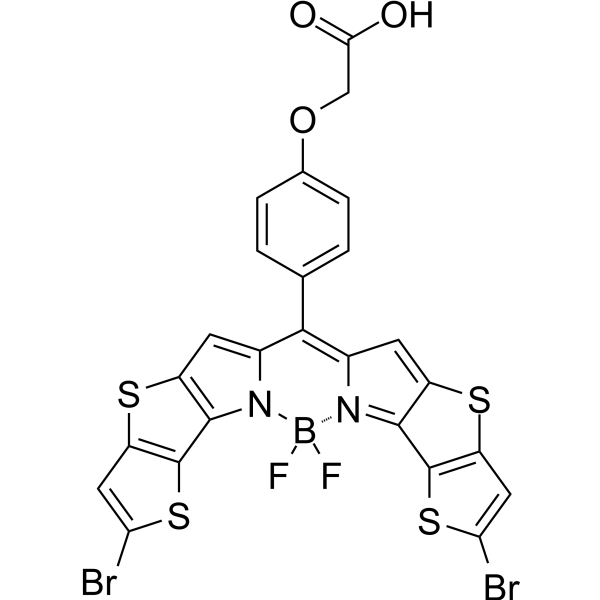
- HY-156088
-
|
|
Microtubule/Tubulin
Apoptosis
|
Cancer
|
|
SSE1806 is a derivative of podophyllotoxin (a natural antimitotic agent) and a microtubule/tubulin inhibitor with significant anticancer and antiproliferative activities. The GI50 of SSE1806 on cancer cell growth ranges from 1.29-21.15 μM. SSE1806 causes mitotic abnormalities and G2/M phase arrest, increases p53 expression, and inhibits colon cancer organoid growth. SSE1806 is able to overcome multidrug resistance in cell lines overexpressing MDR-1 .
|
-
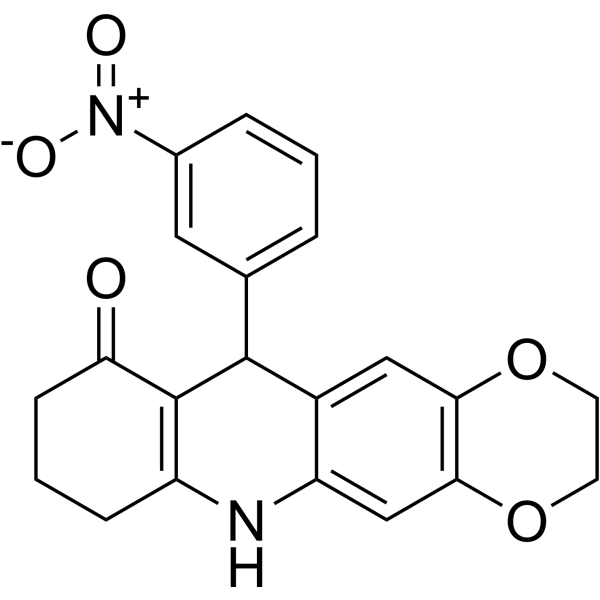
- HY-146411
-
|
|
MicroRNA
Apoptosis
|
Cancer
|
|
microRNA-21-IN-1 (compound A7) is an efficient microRNA inhibitor. microRNA-21-IN-1 has antiproliferative activity against Hela and HCT-116 cells with IC50s of 5.5 μM and 2.8 μM respectively, as well as promotes apoptosis of Hela cells. microRNA-21-IN-1 upregulates the expression of microRNA-21 downstream functional targets (PTEN, EGR1 and SLIT2). microRNA-21-IN-1 can be used for researching anticancer .
|
-
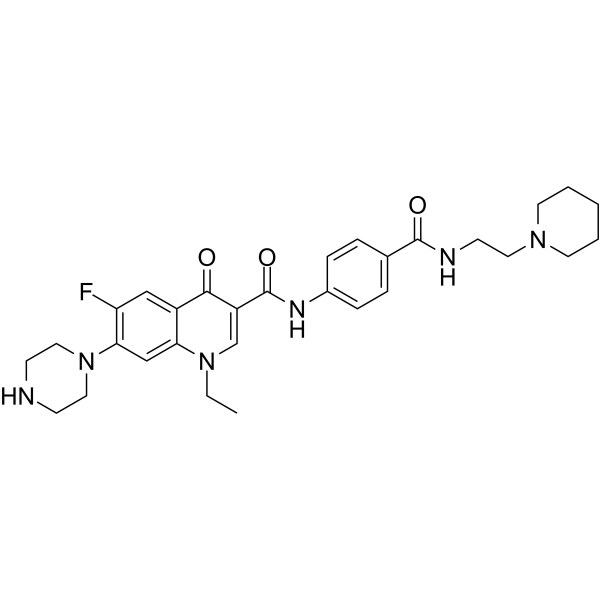
- HY-N10503
-
|
|
Tyrosinase
Ras
Raf
MAPKAPK2 (MK2)
Apoptosis
|
Cancer
|
|
Norartocarpetin is a tyrosinase inhibitor. Norartocarpetin has strong tyrosinase inhibitory activity with an IC50 value of 0.47 μM. Norartocarpetin as an antibrowning agent can be used for the research of food systems. Norartocarpetin also has a significant anticancer activity in lung carcinoma cells (NCI-H460) with an IC50 value of 22 μM. Norartocarpetin has antiproliferative effects are mediated via targeting Ras/Raf/MAPK signalling pathway, mitochondrial mediated apoptosis, S-phase cell cycle arrest and suppression of cell migration and invasion in human lung carcinoma cells .
|
-
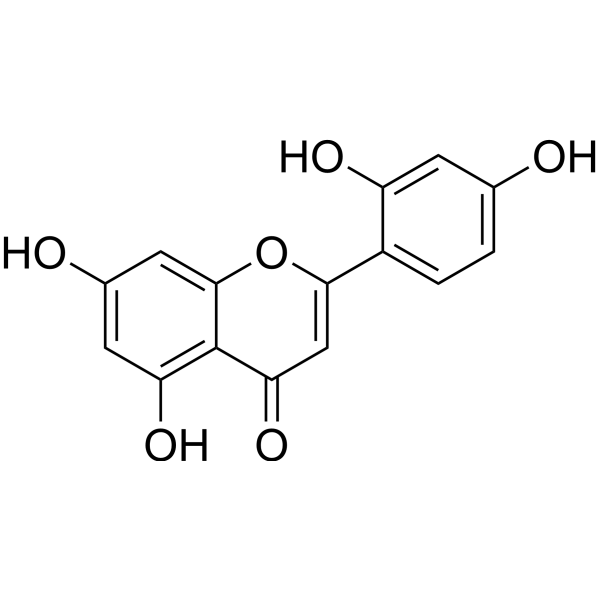
| Cat. No. |
Product Name |
Type |
-
- HY-110002
-
|
|
Biochemical Assay Reagents
|
|
LFM-A13 is a potent BTK, JAK2, PLK inhibitor, inhibits recombinant BTK, Plx1 and PLK3 with IC50s of 2.5 μM, 10 μM and 61 μM. LFM-A13 has antiproliferative activity and anticancer activity. LFM-A13 can be used in cancer-related research
|
| Cat. No. |
Product Name |
Target |
Research Area |
-
- HY-P2228
-
|
|
HDAC
Apoptosis
|
Cancer
|
|
Chlamydocin, a fungal metabolite, is a highly potent HDAC inhibitor, with an IC50 of 1.3 nM. Chlamydocin exhibits potent antiproliferative and anticancer activities. Chlamydocin induces apoptosis by activating caspase-3 .
|
-
- HY-131923
-
|
|
Notch
|
Cancer
|
|
DAPM is a Notch pathway inhibitor with anticancer activity and antiproliferative effects. DAPM effectively inhibits tubular adenoma development by inhibiting cell proliferation and inducing the expression of Krüppel-like factor 4 (KLF4) and p21 in human colon cancer cells .
|
| Cat. No. |
Product Name |
Category |
Target |
Chemical Structure |
| Cat. No. |
Product Name |
|
Classification |
-
- HY-19909
-
|
|
|
Alkynes
|
|
NRC-2694 is an epidermal growth factor receptor (EGFR) antagonist with anti-cancer and anti-proliferative properties. NRC-2694 is a click chemistry reagent, it contains an Alkyne group and can undergo copper-catalyzed azide-alkyne cycloaddition (CuAAc) with molecules containing Azide groups.
|
Your information is safe with us. * Required Fields.
Inquiry Information
- Product Name:
- Cat. No.:
- Quantity:
- MCE Japan Authorized Agent:

















































































































